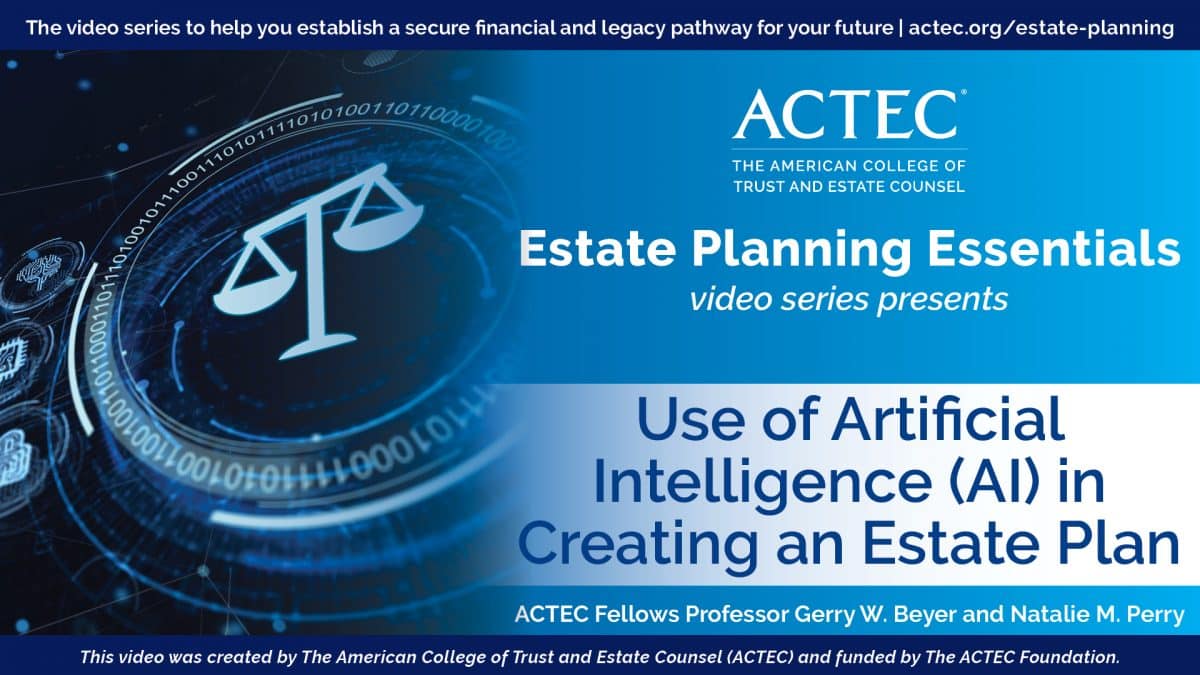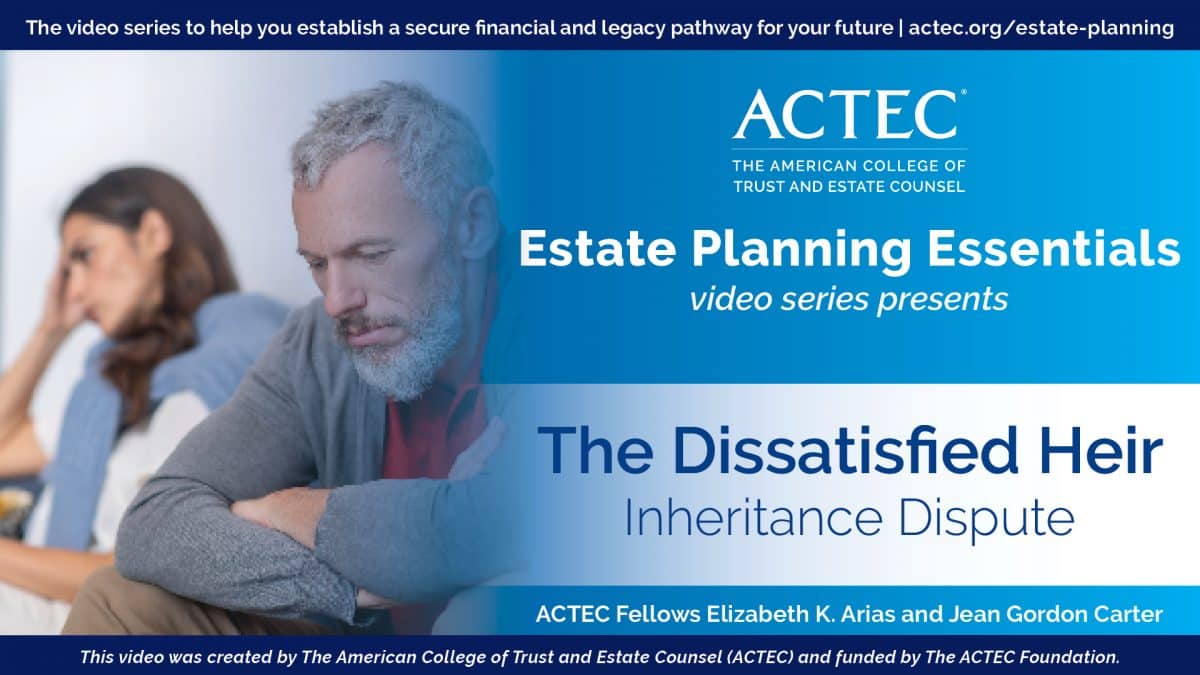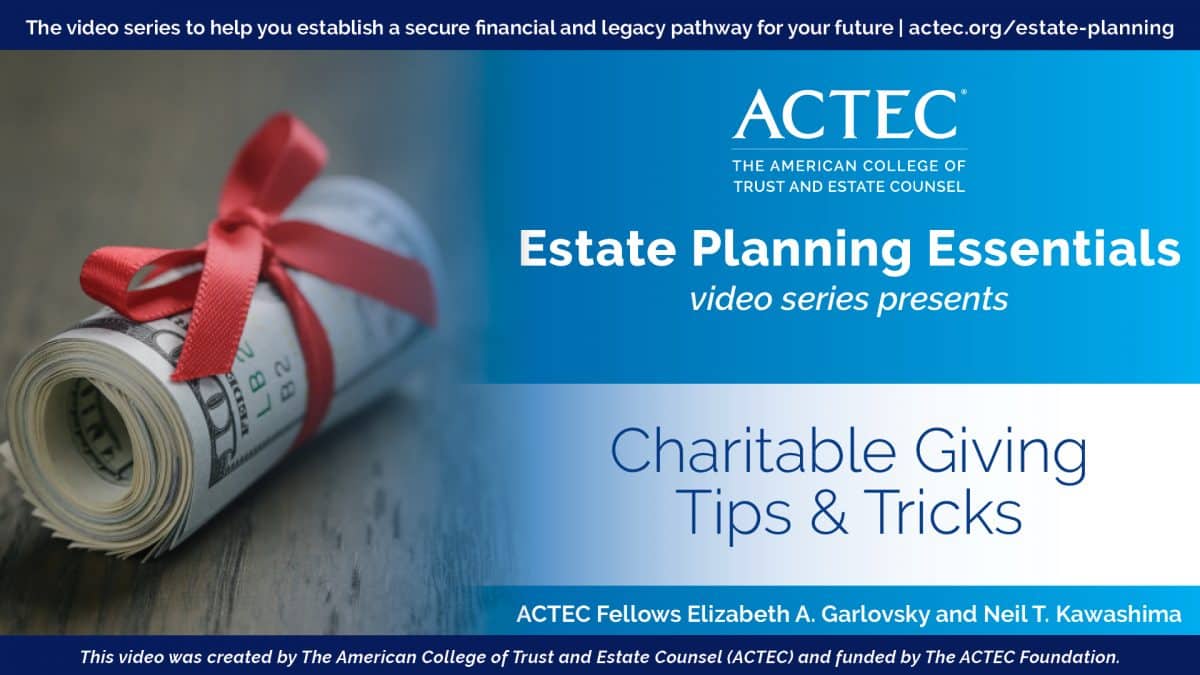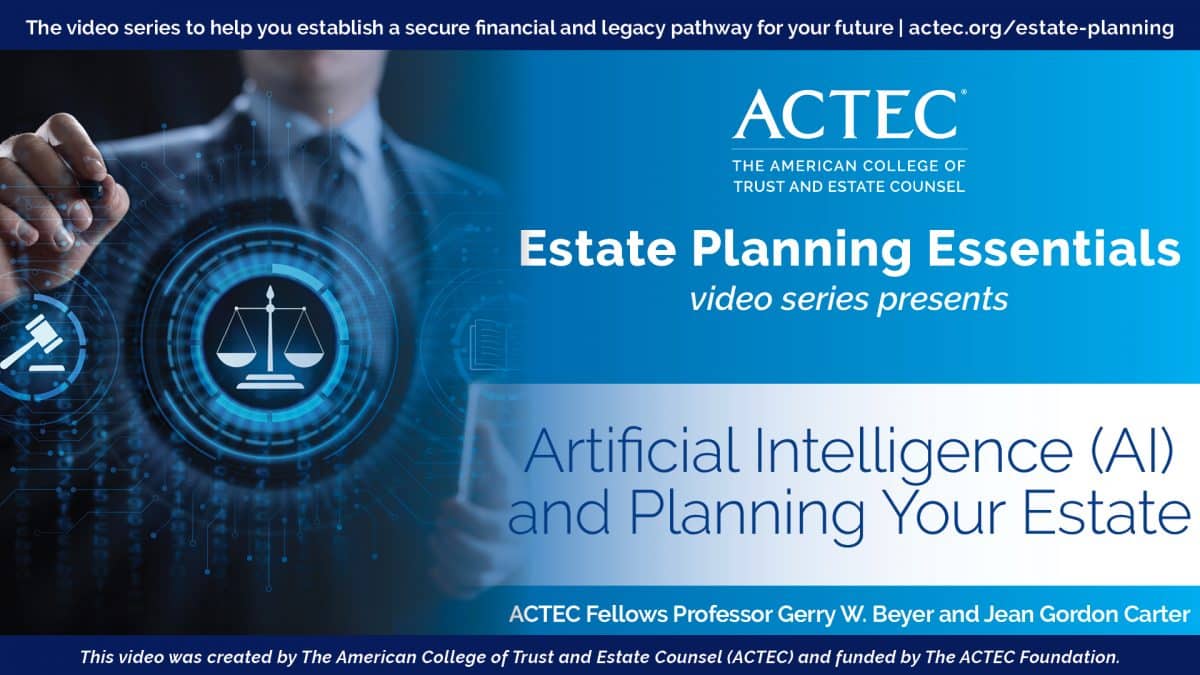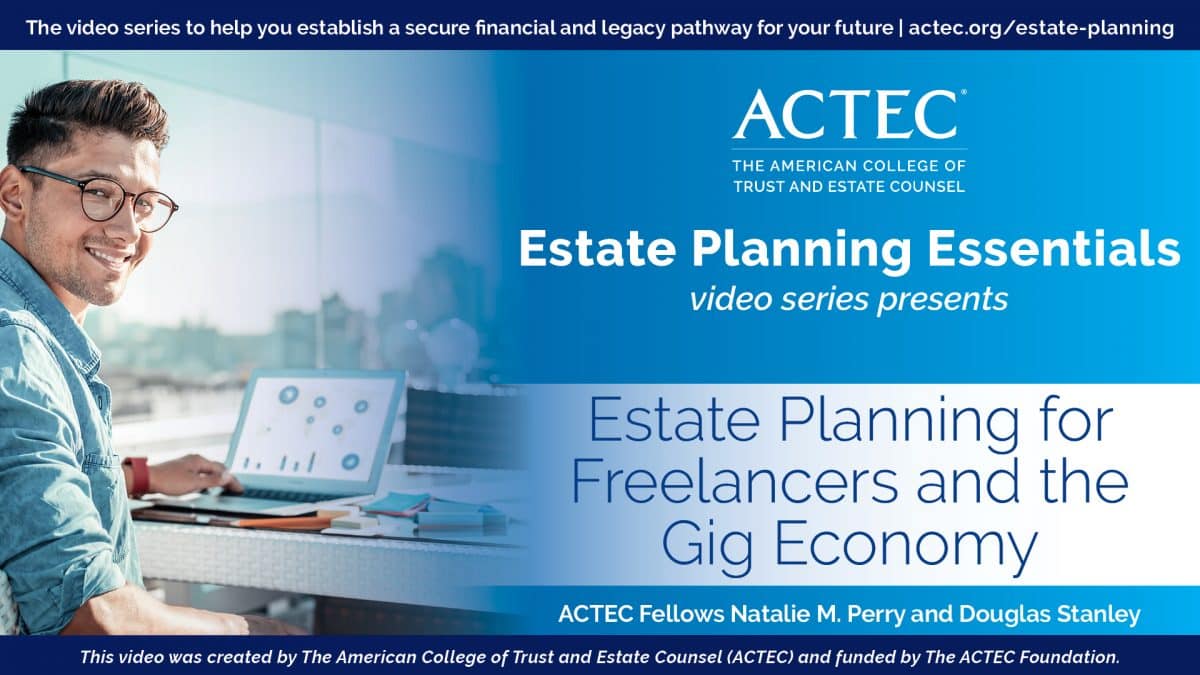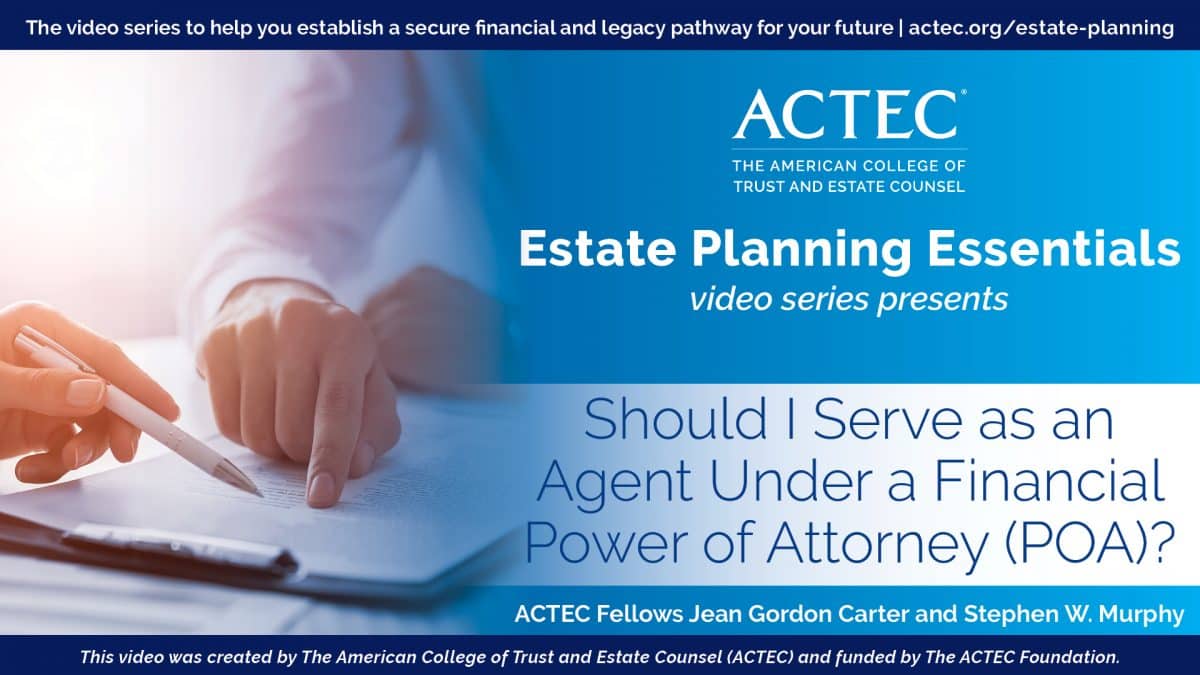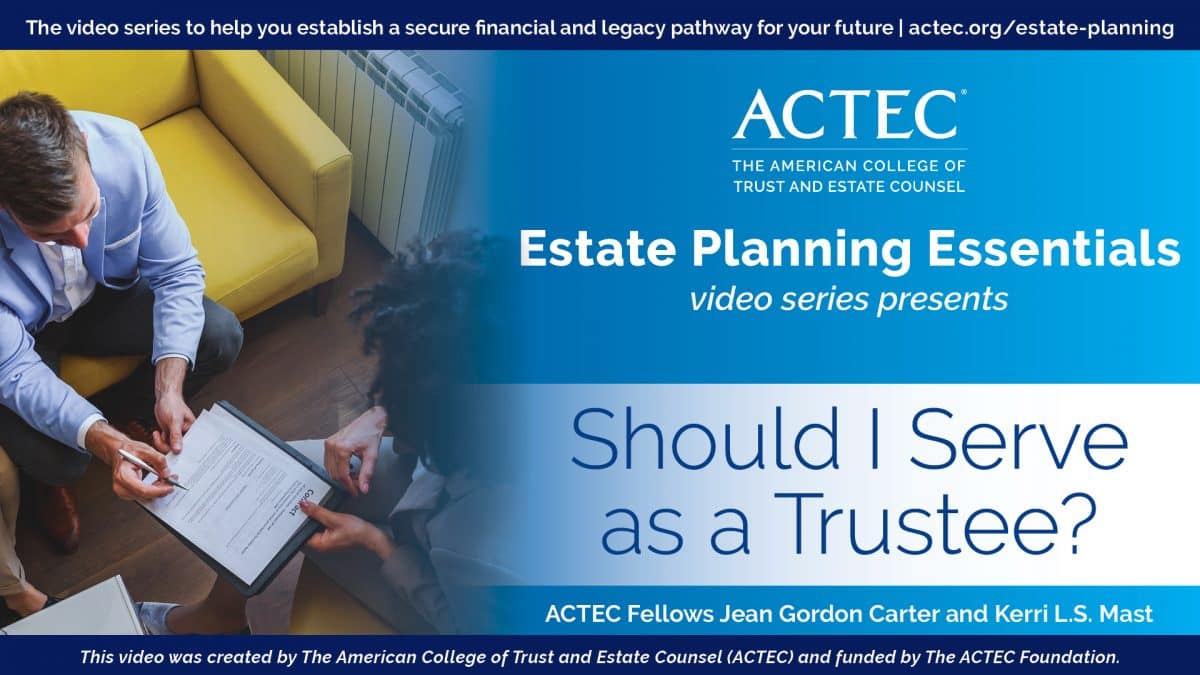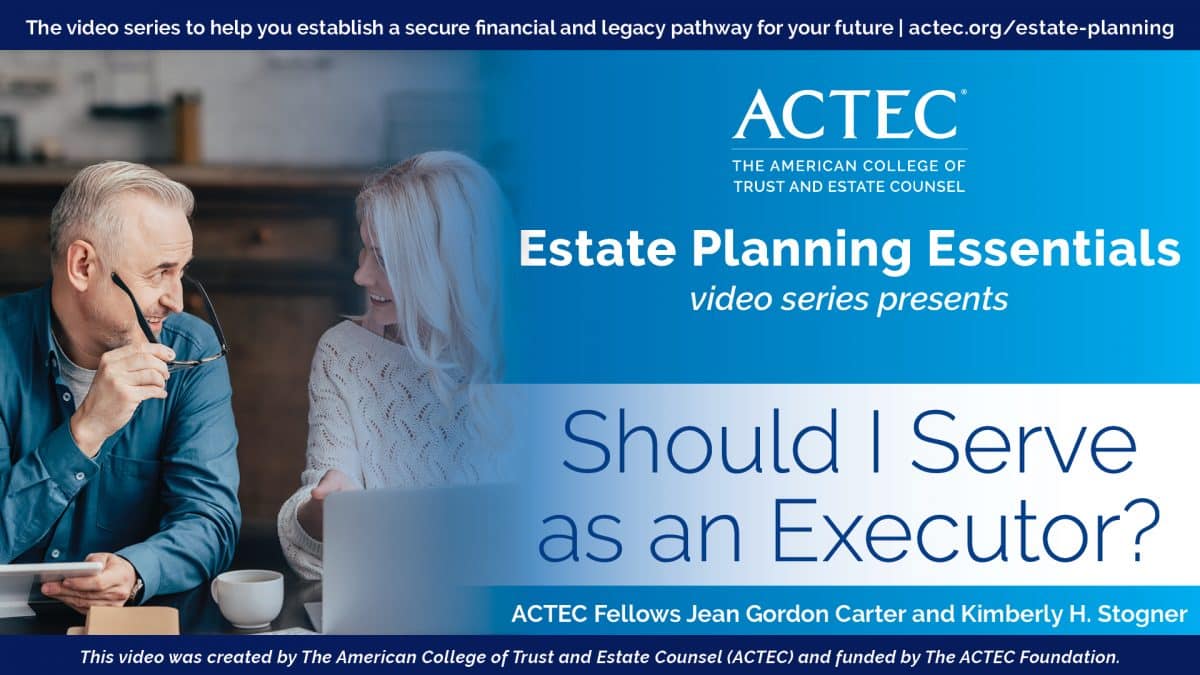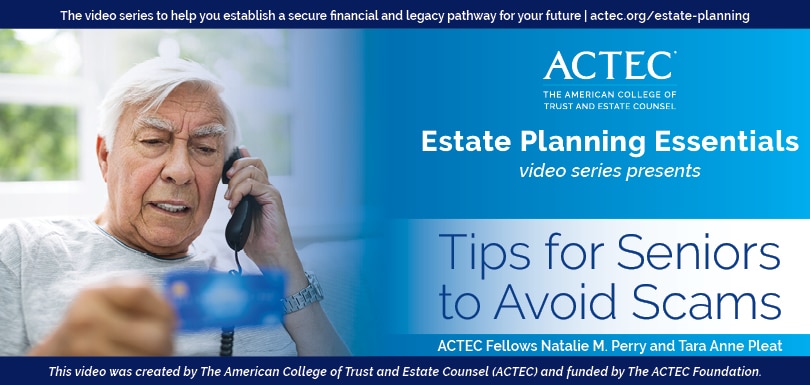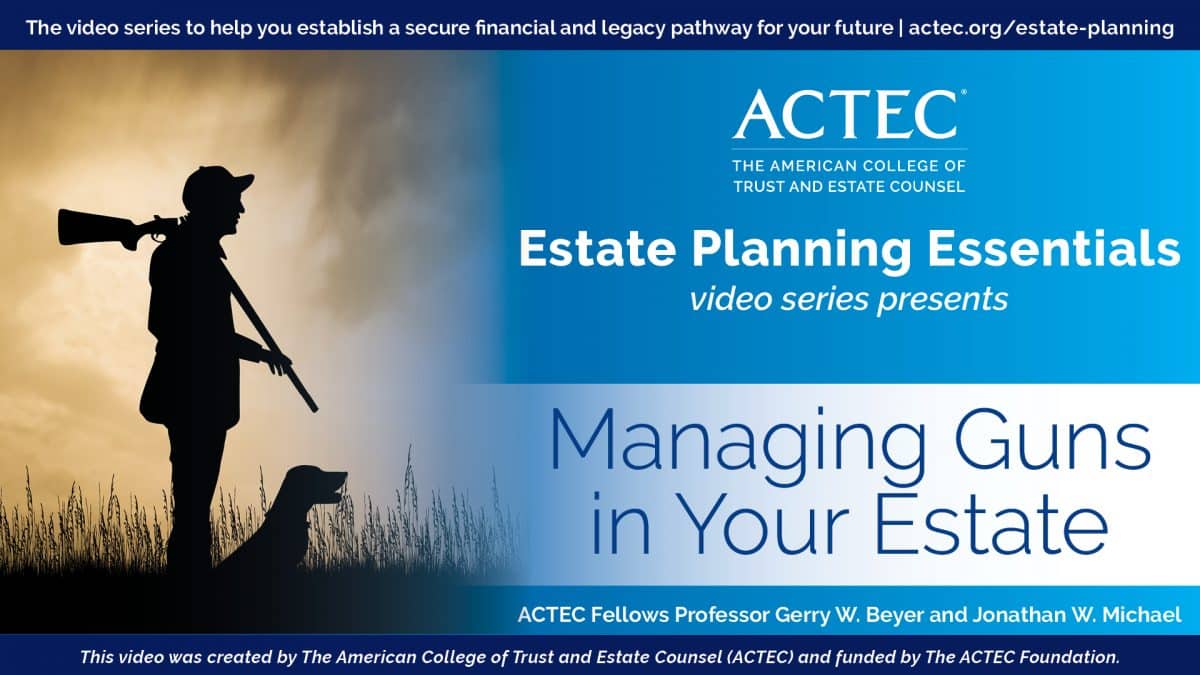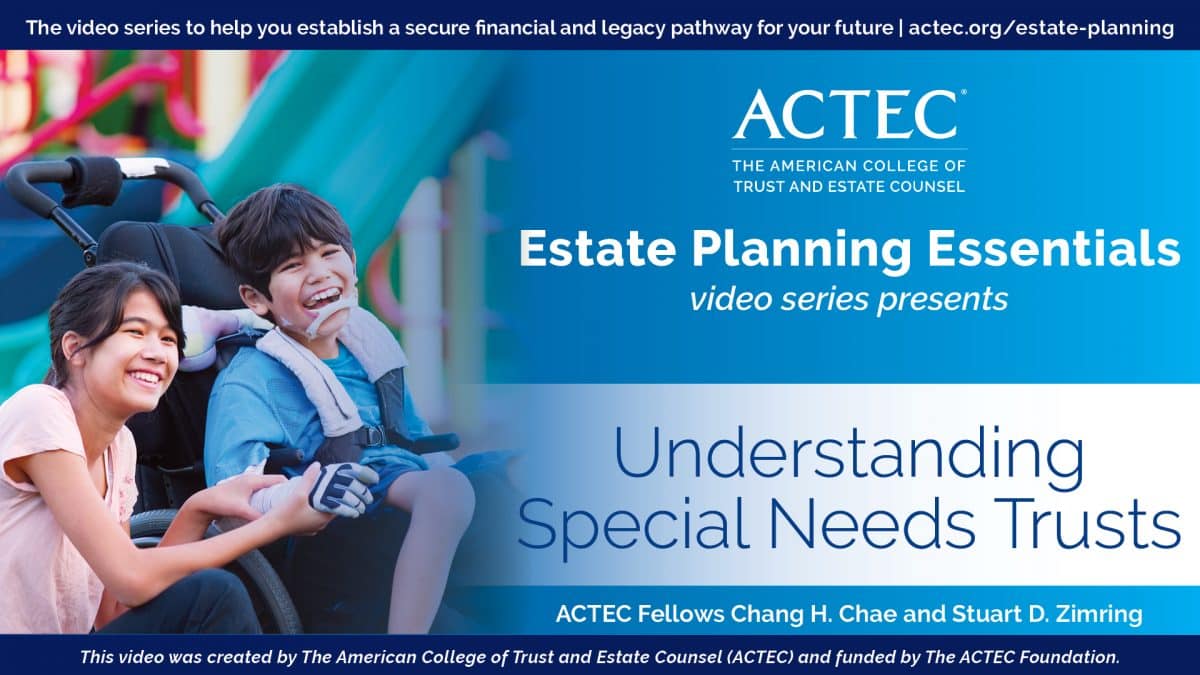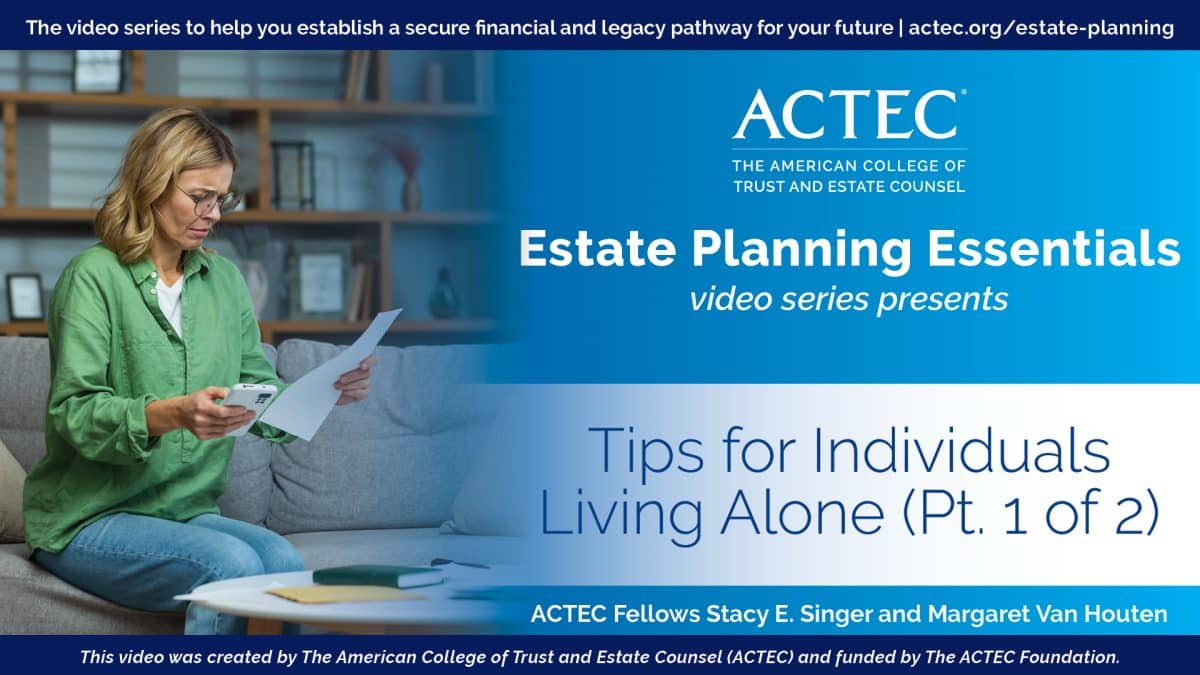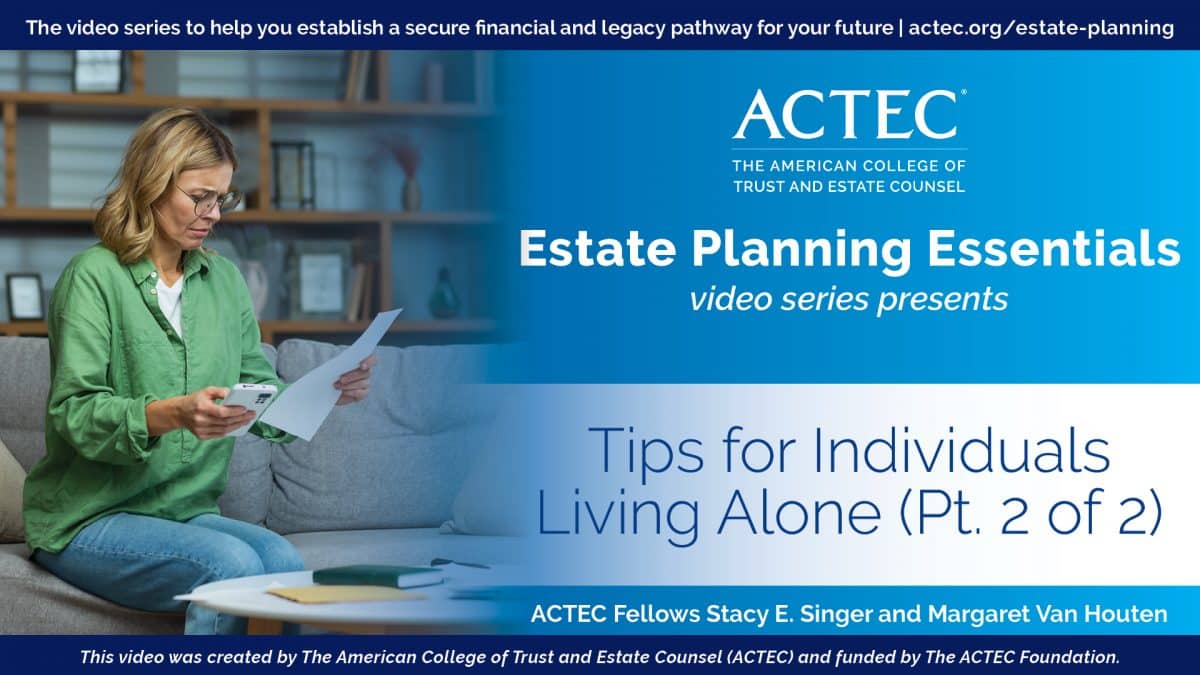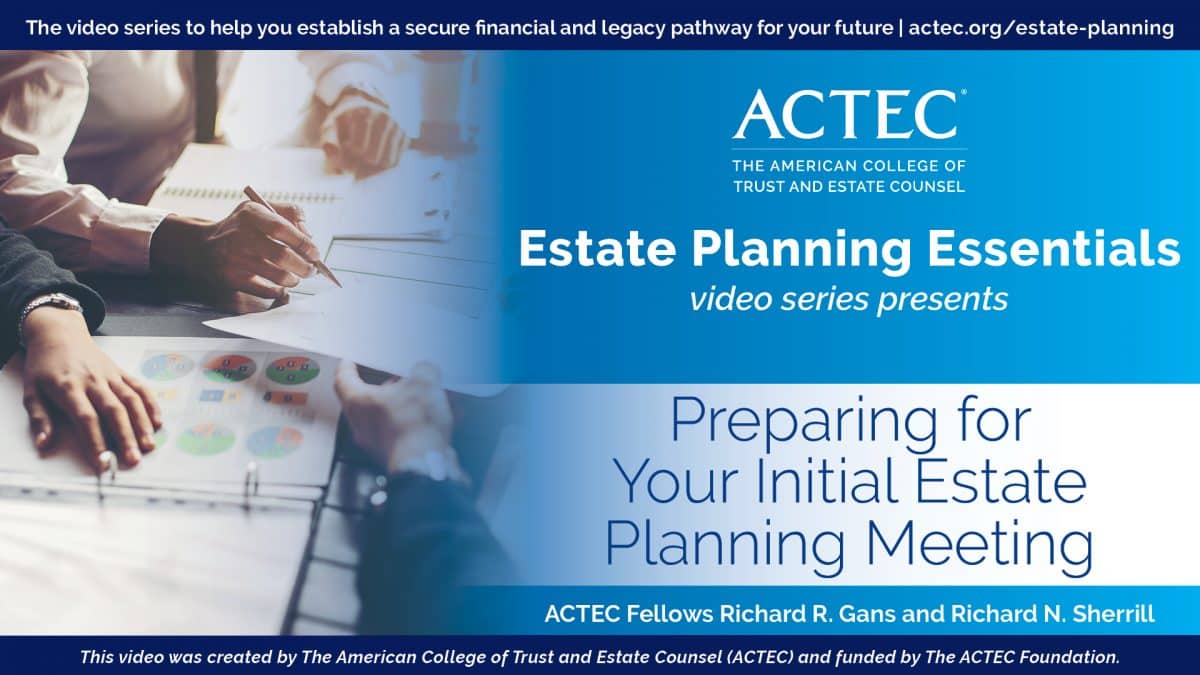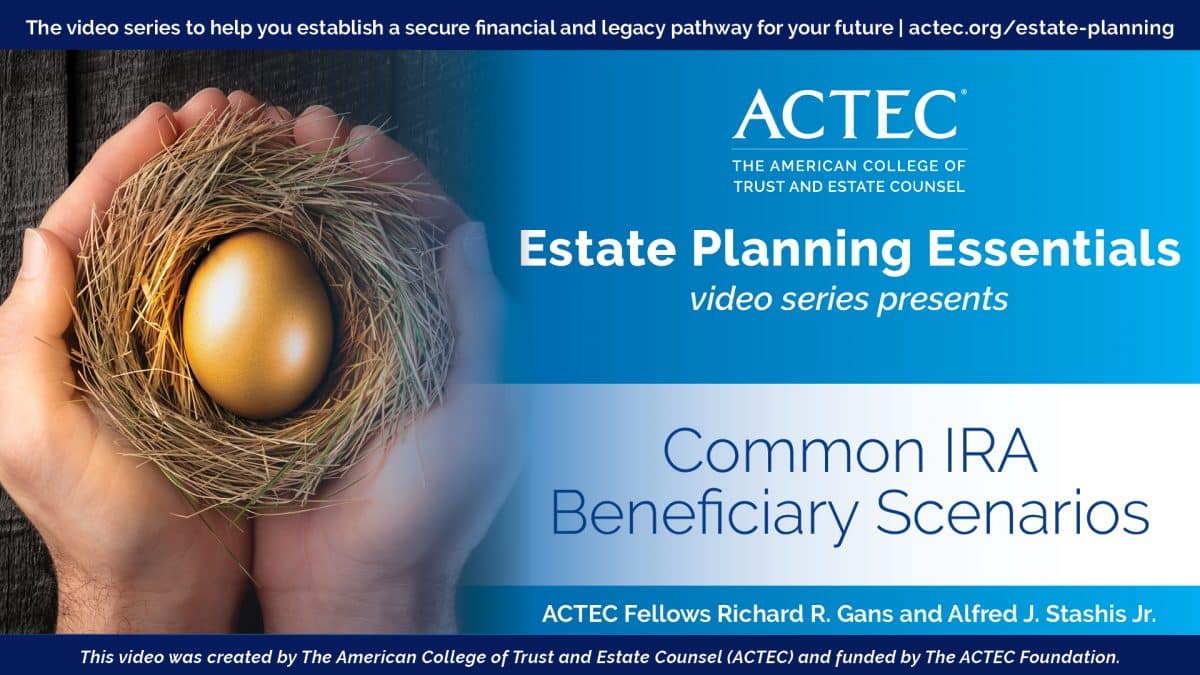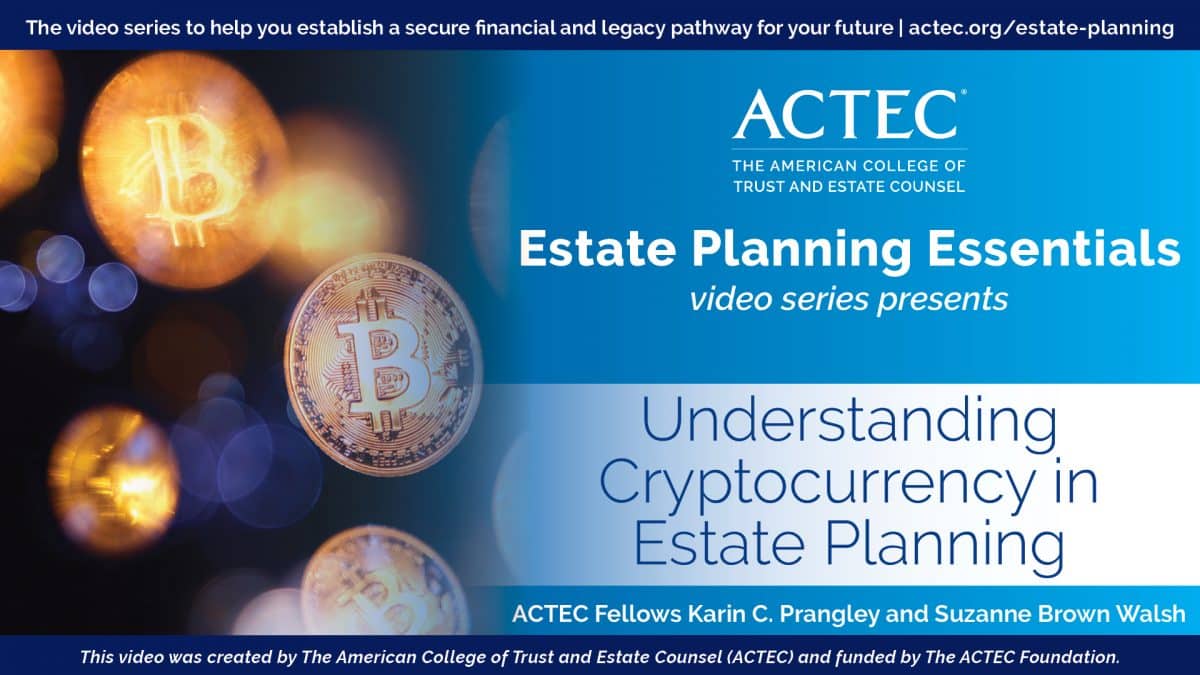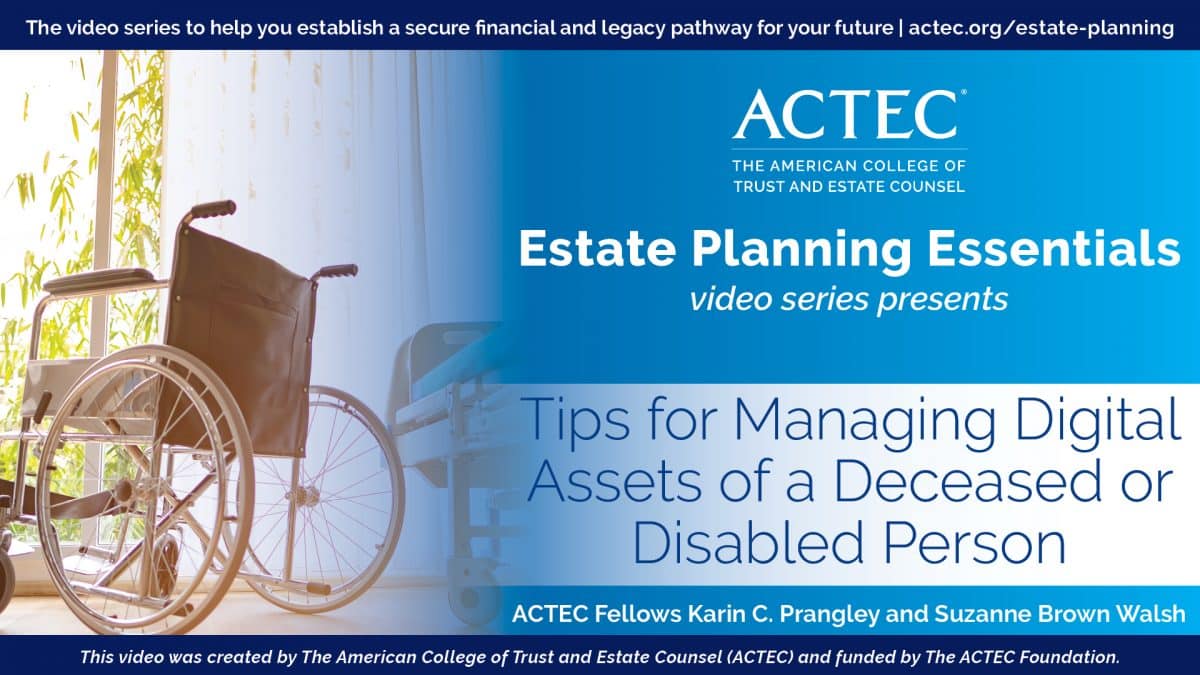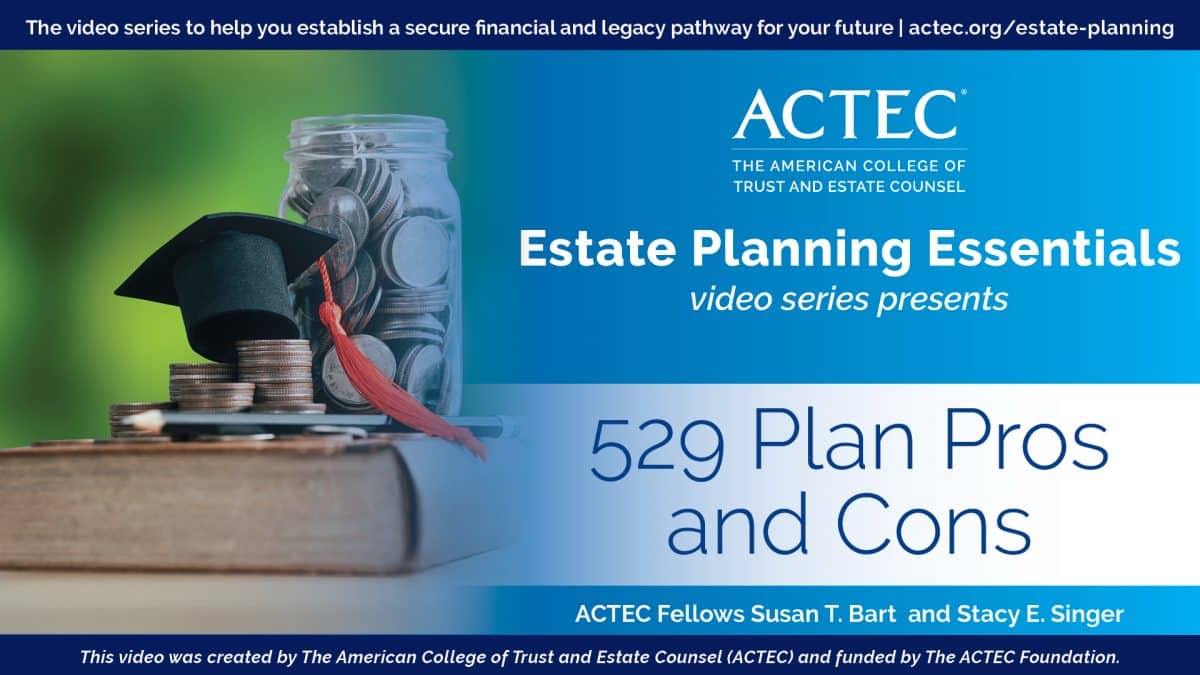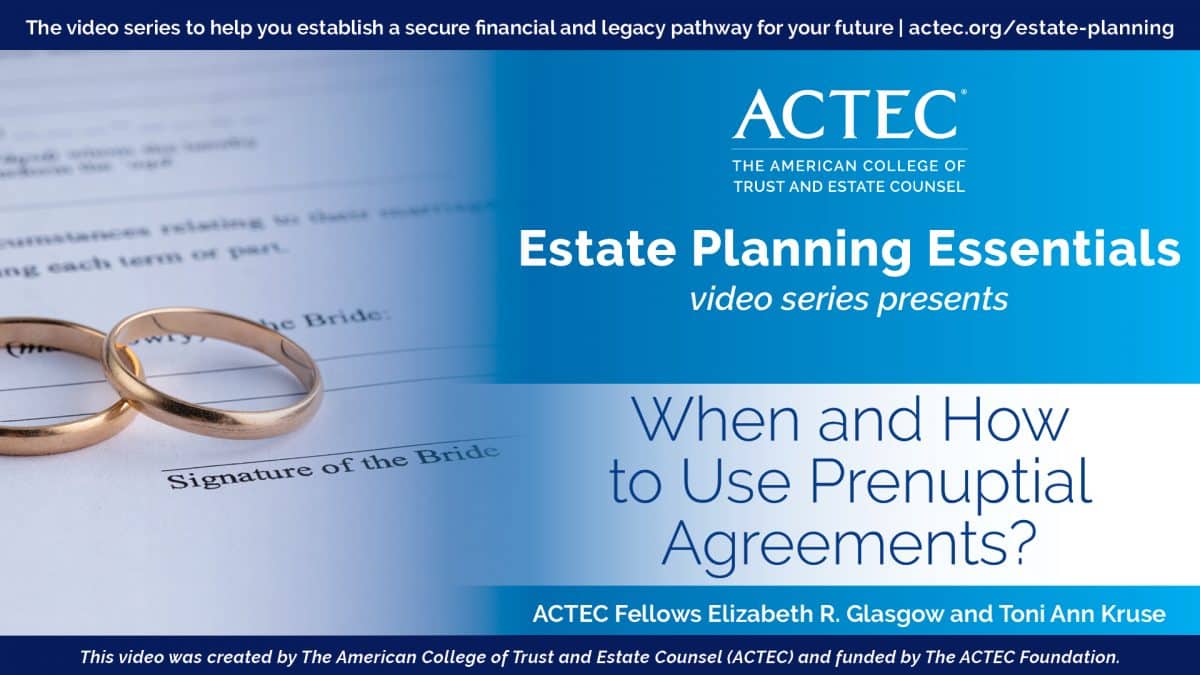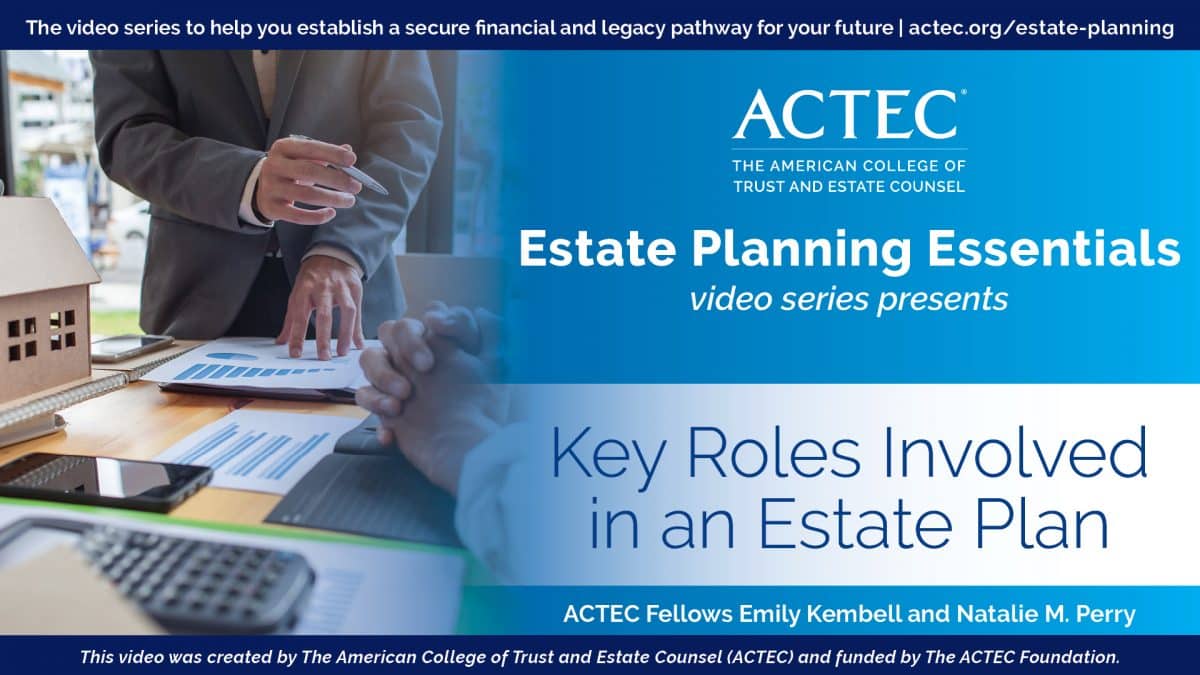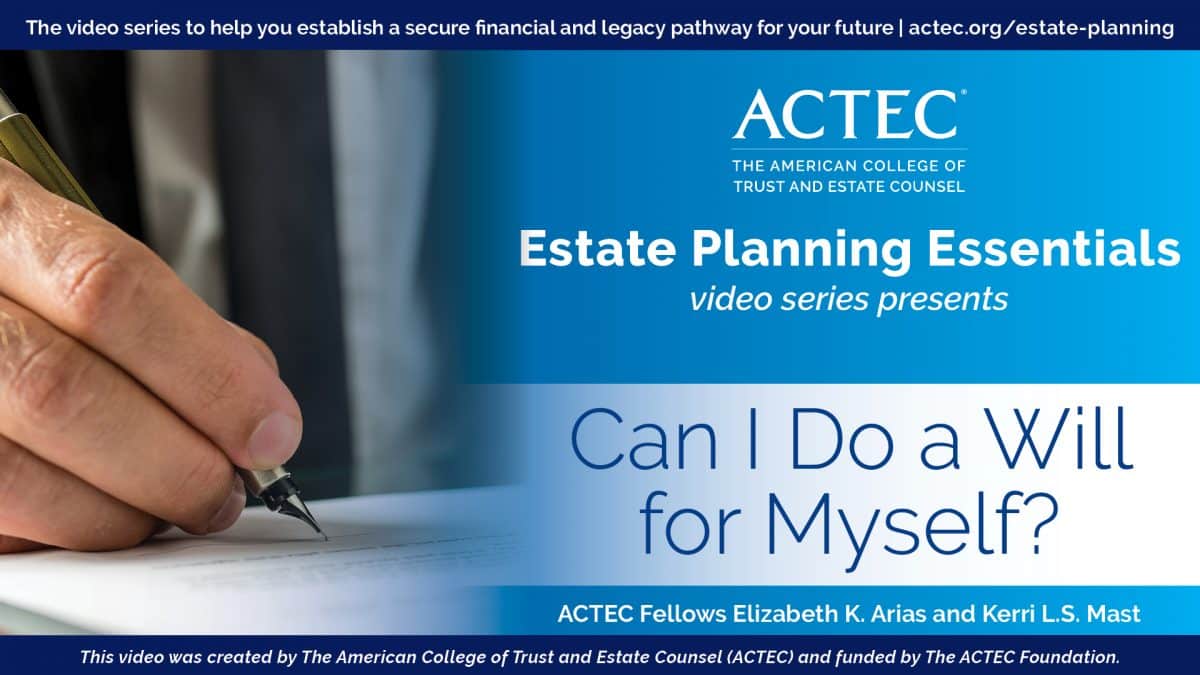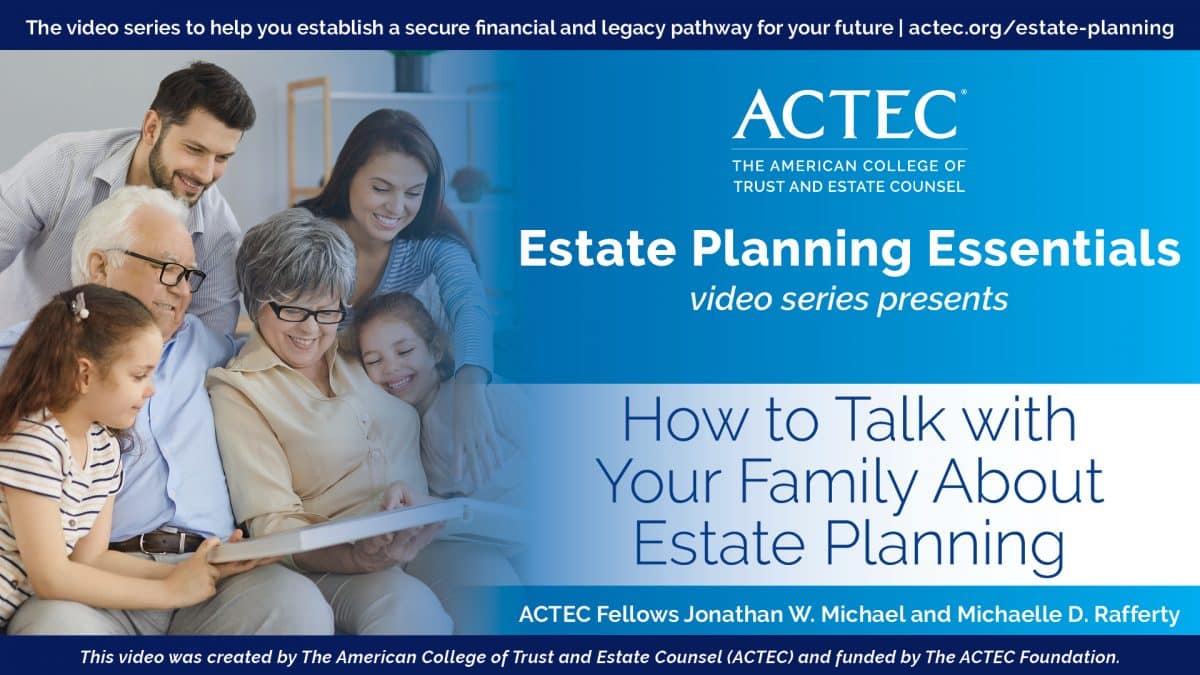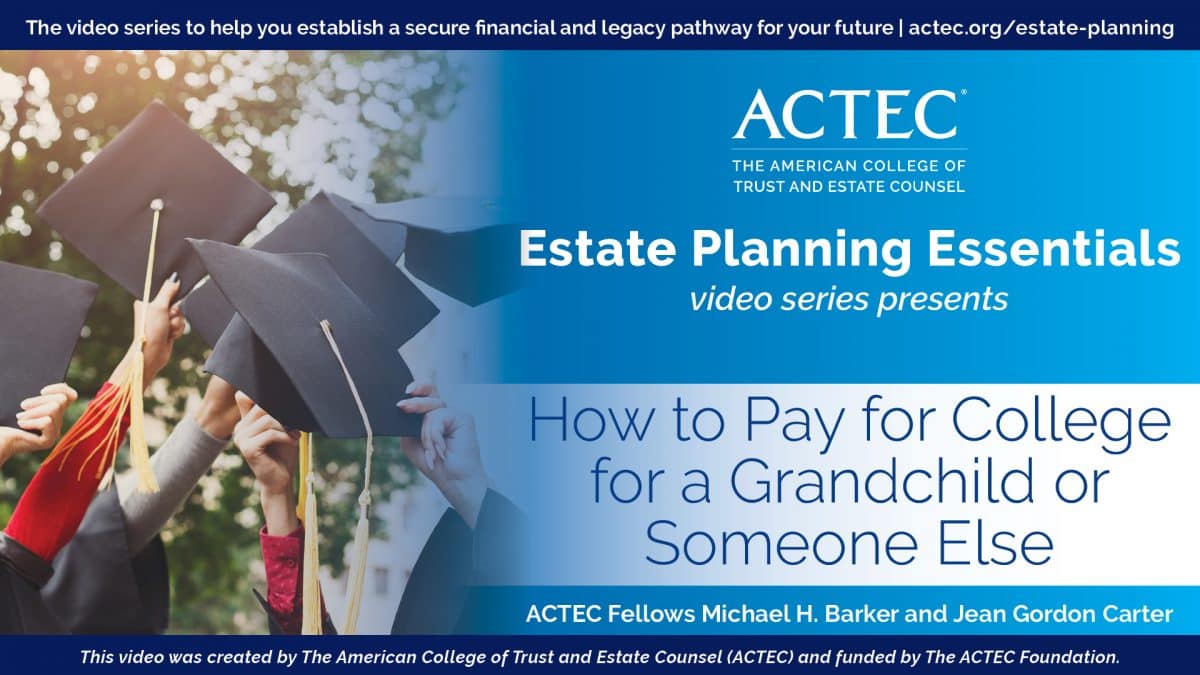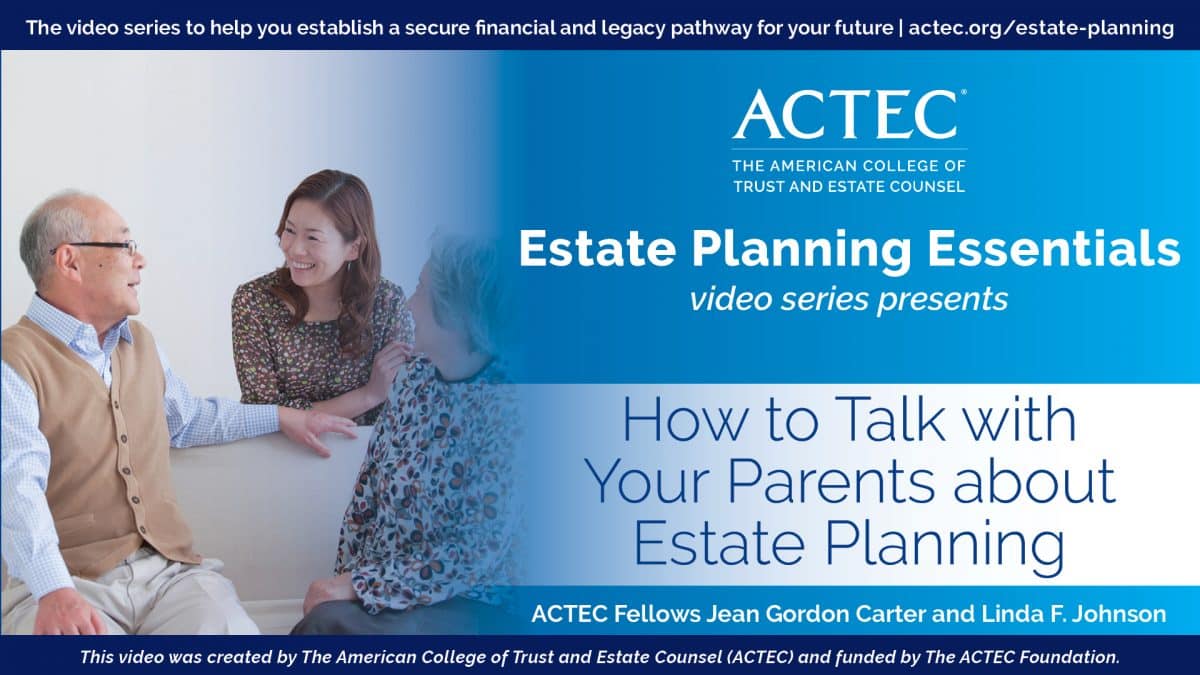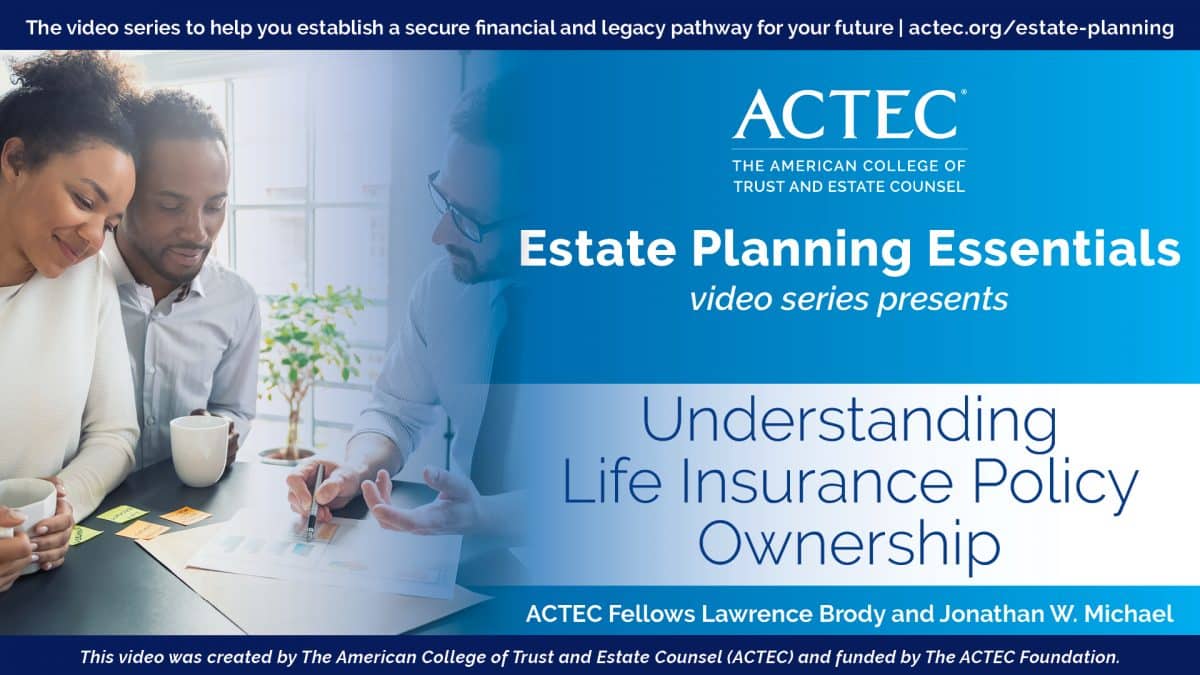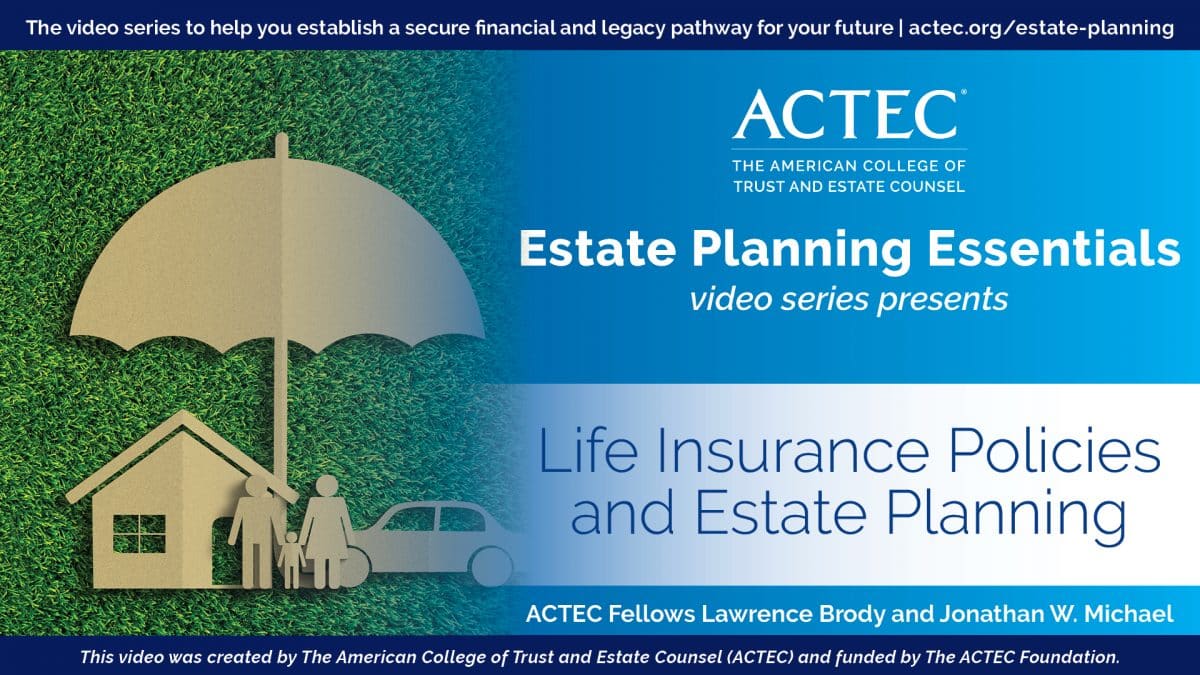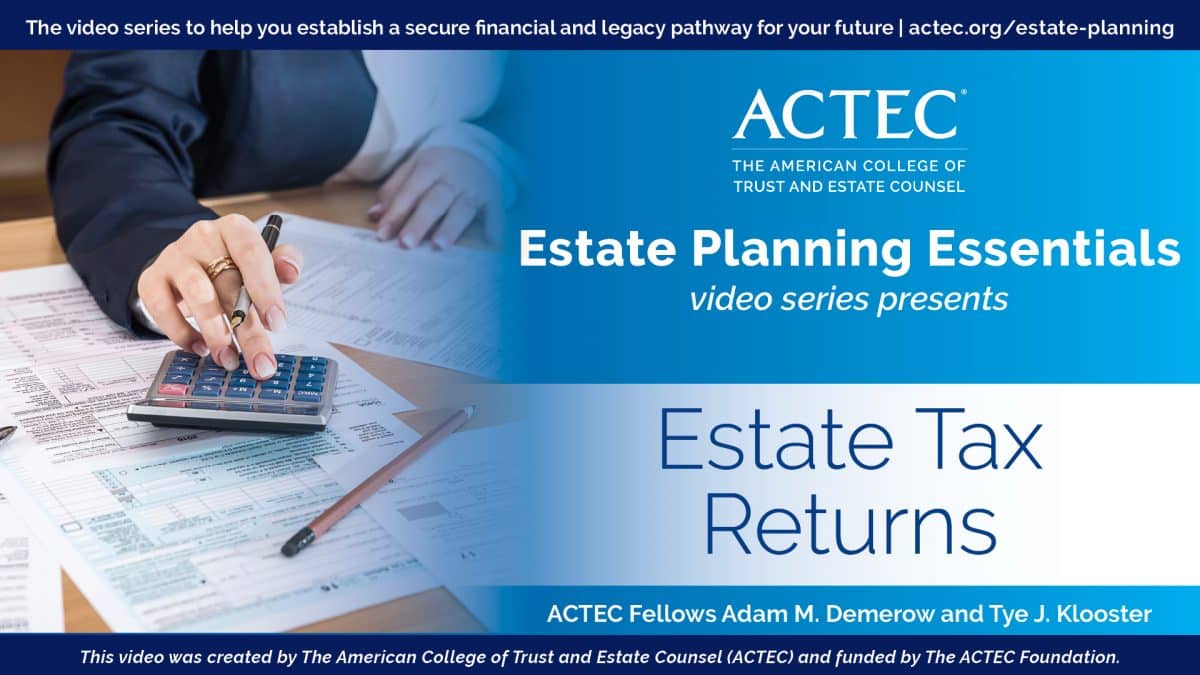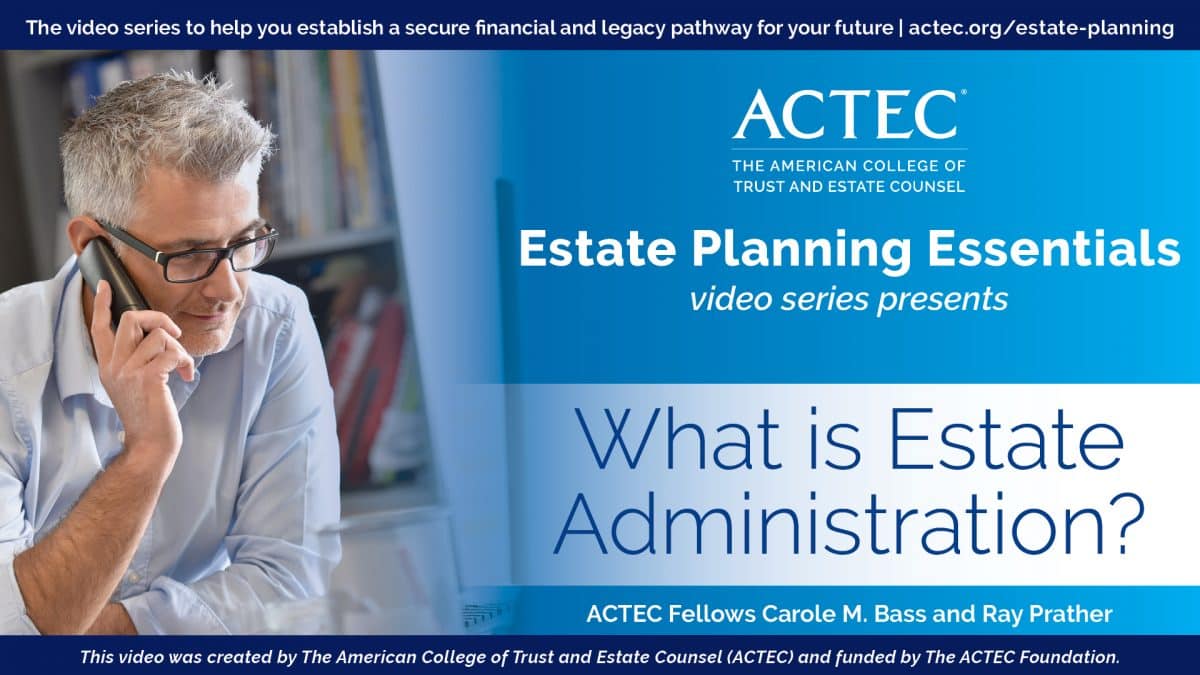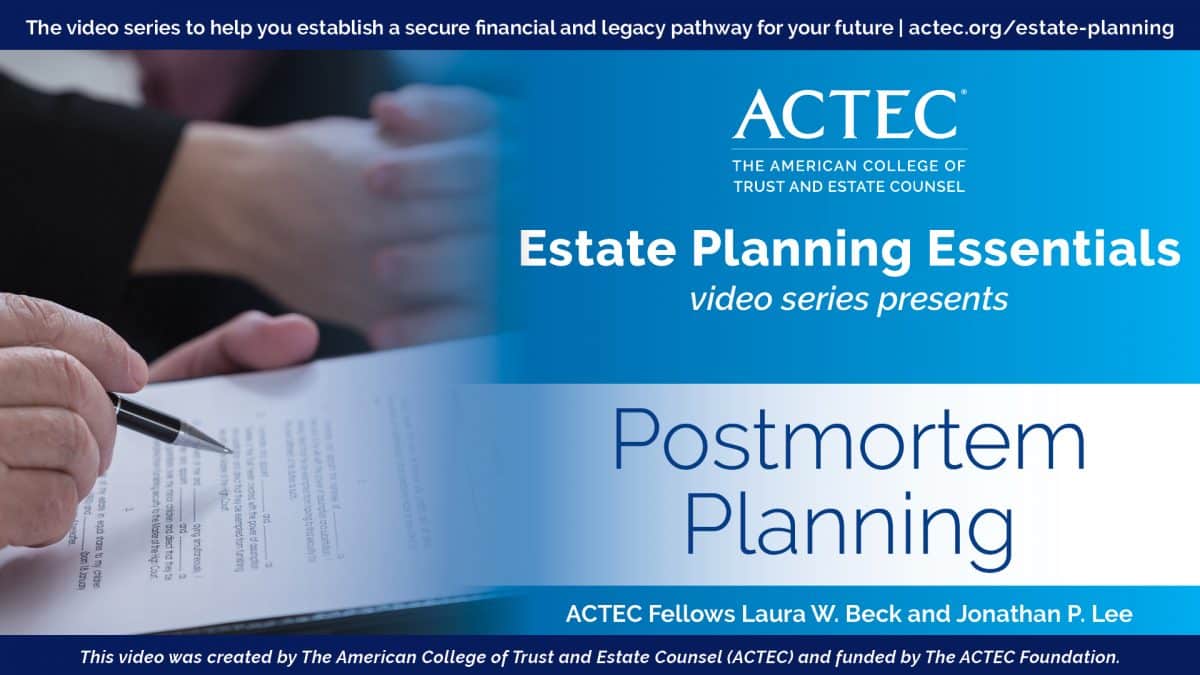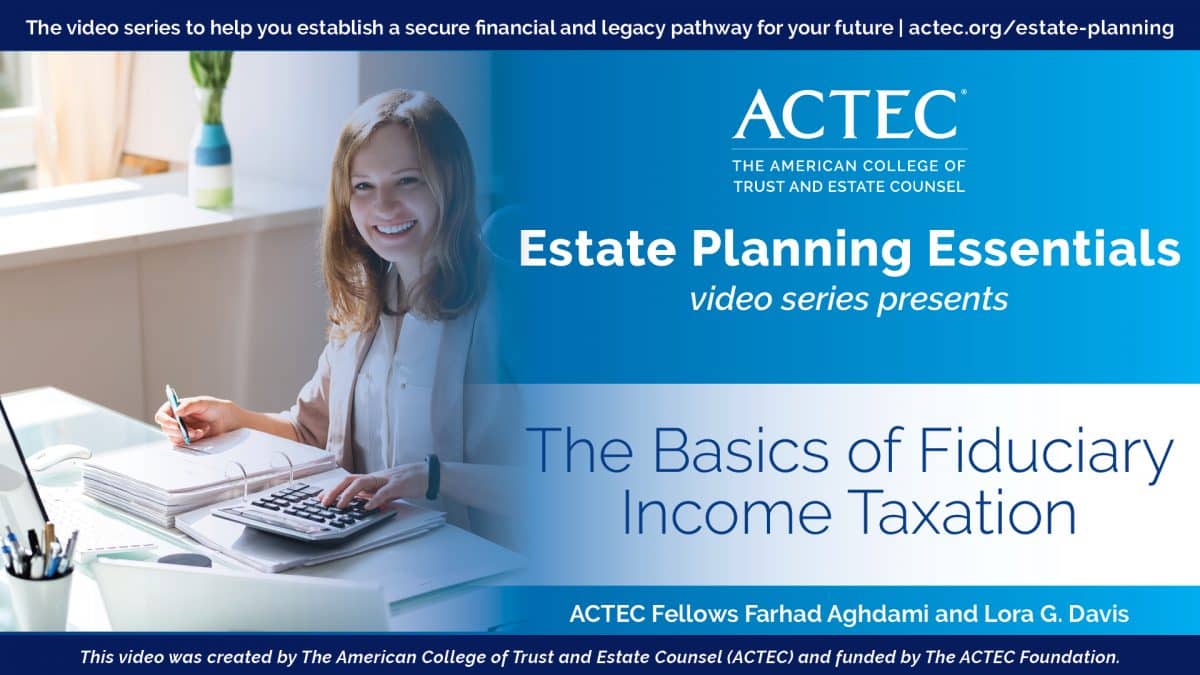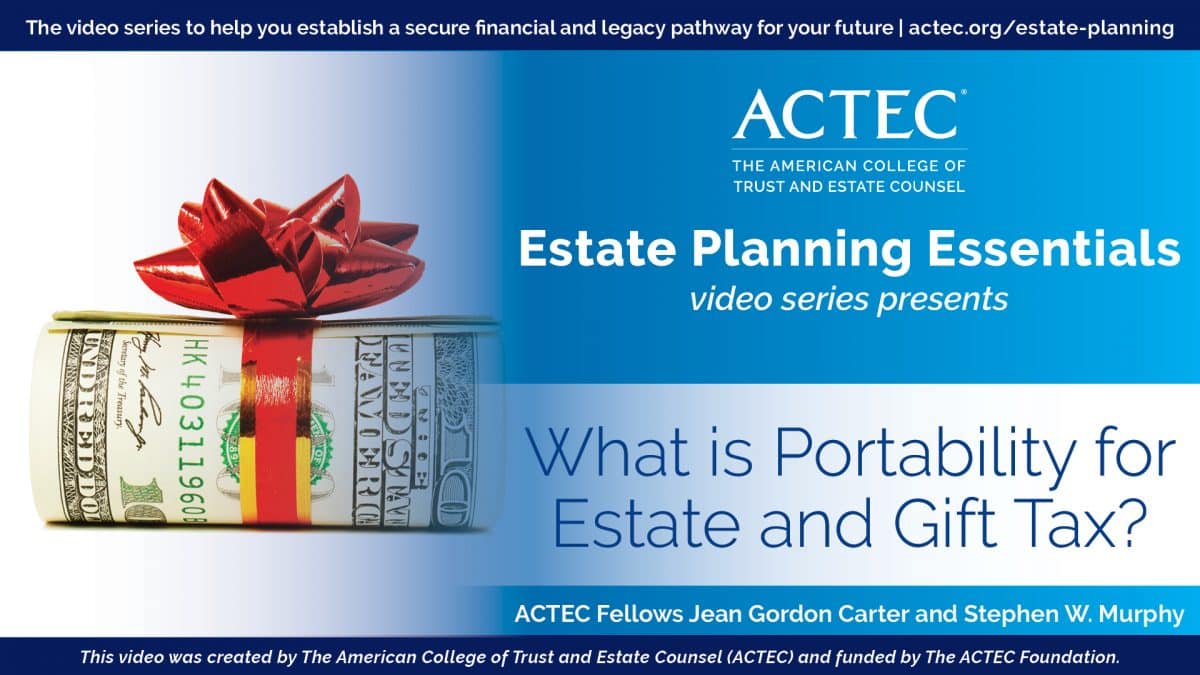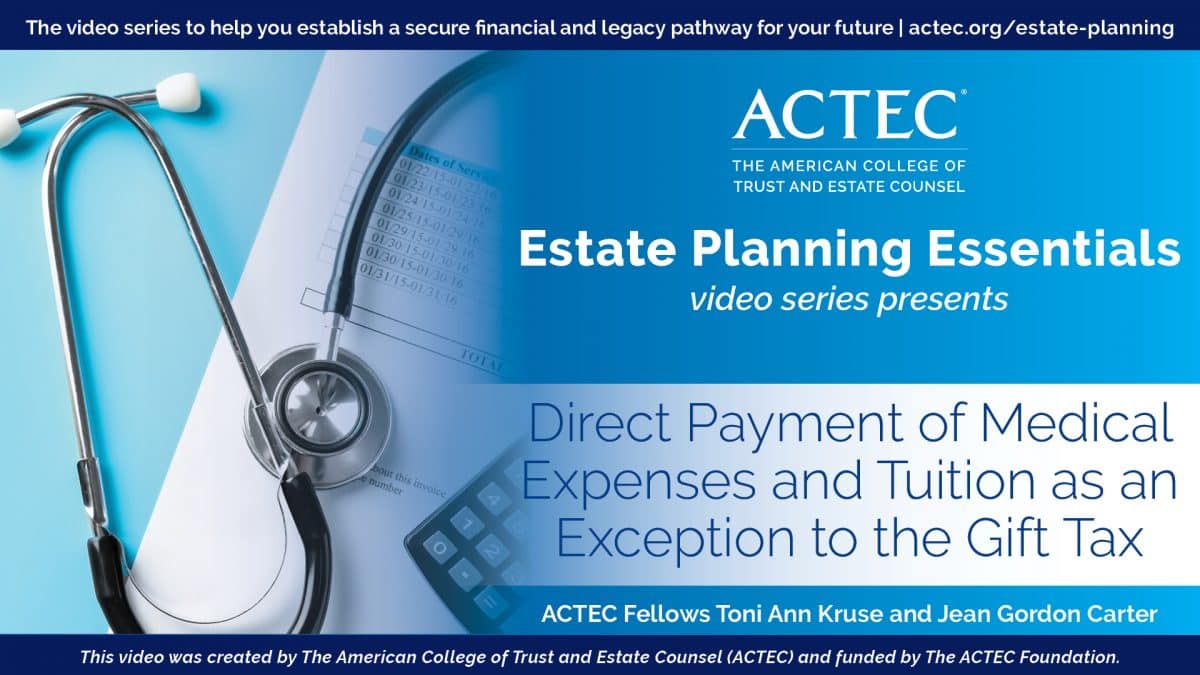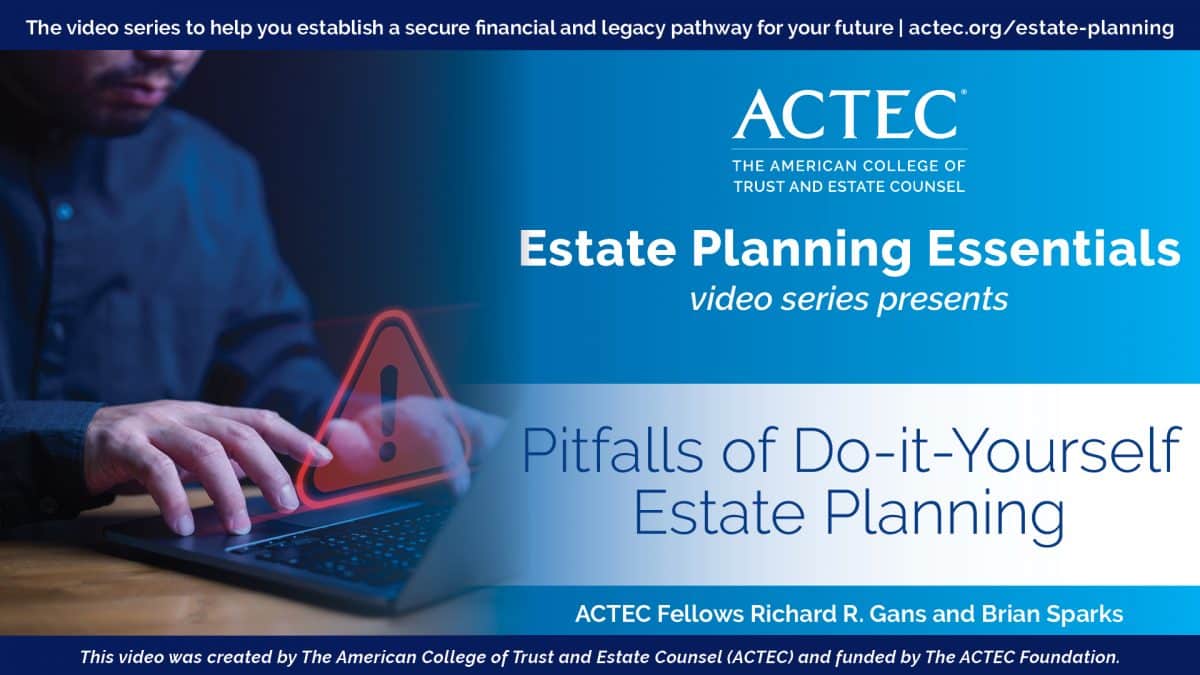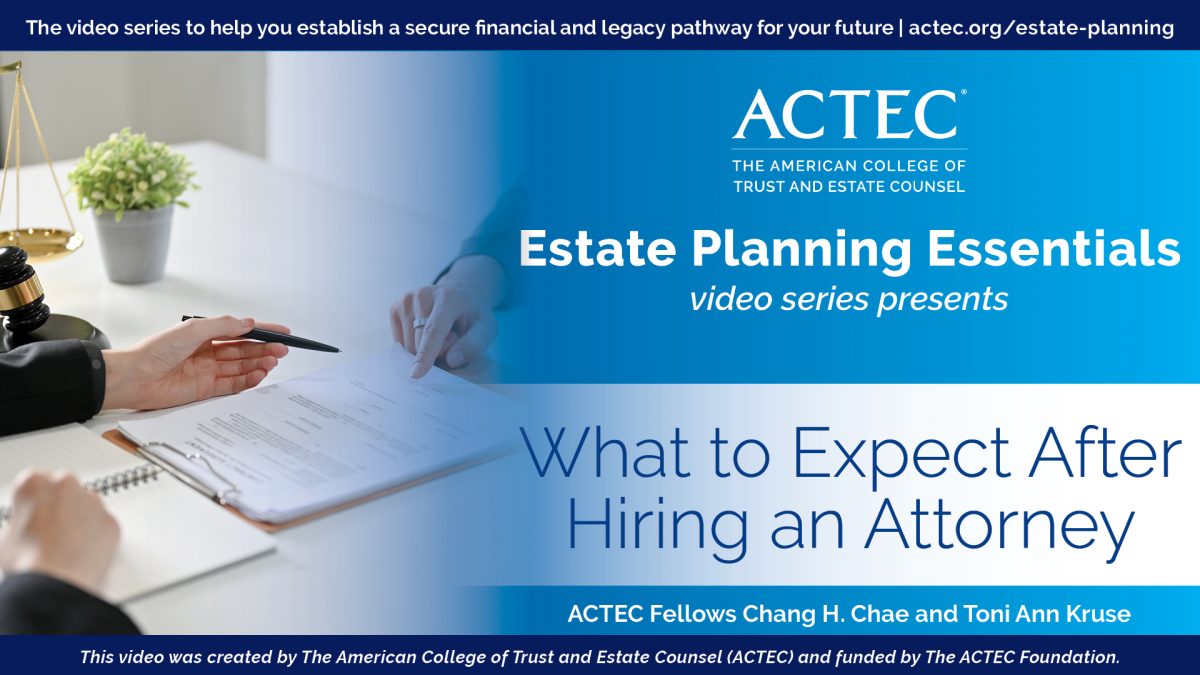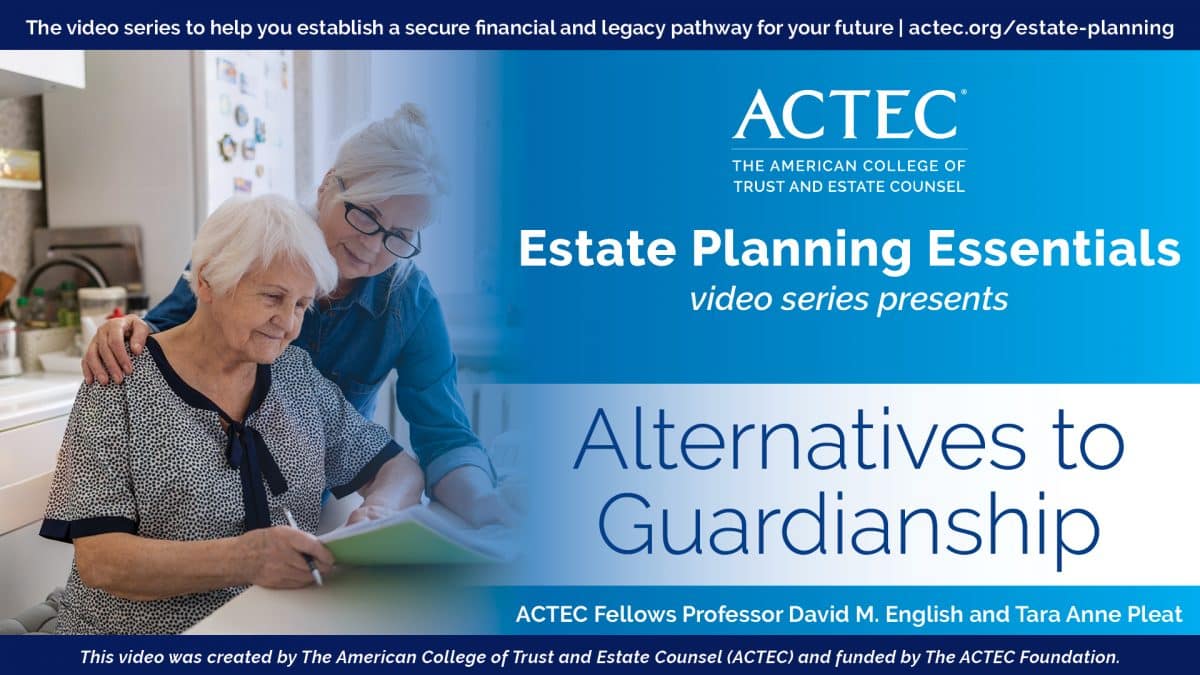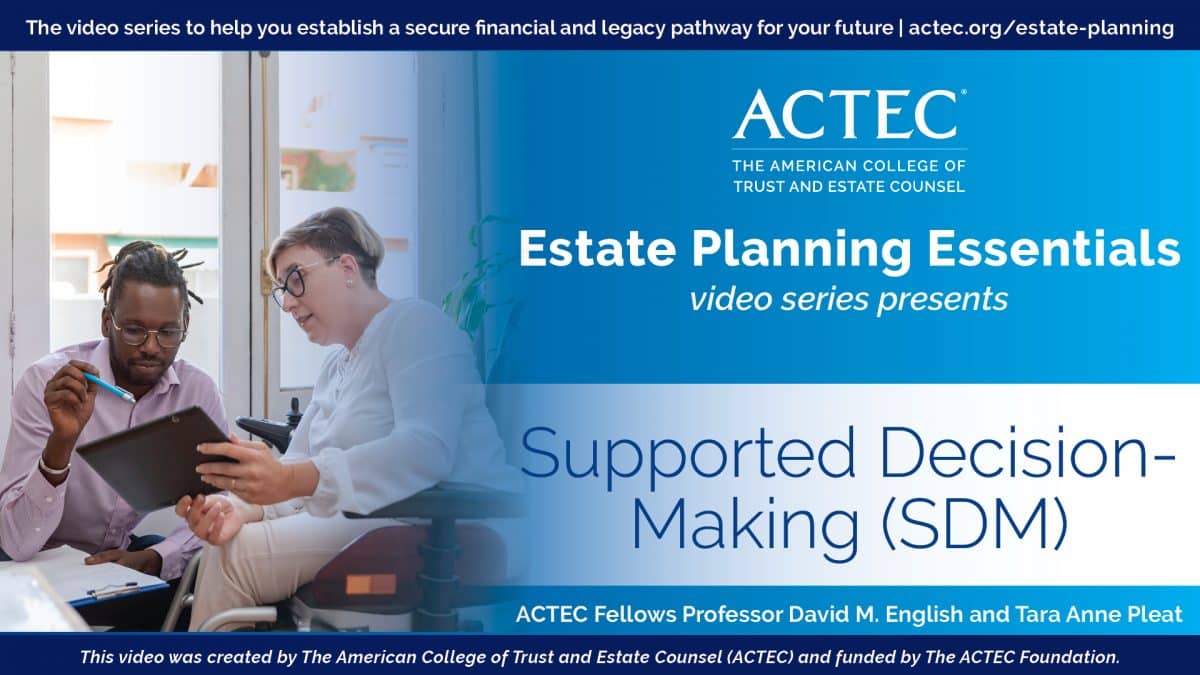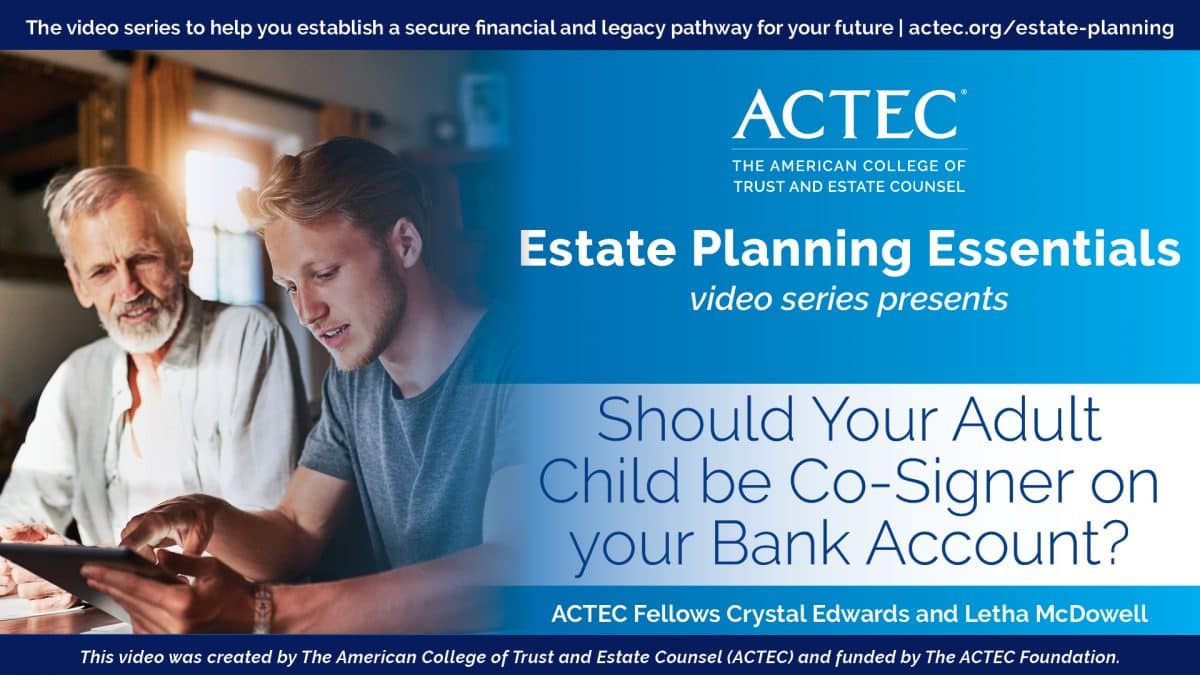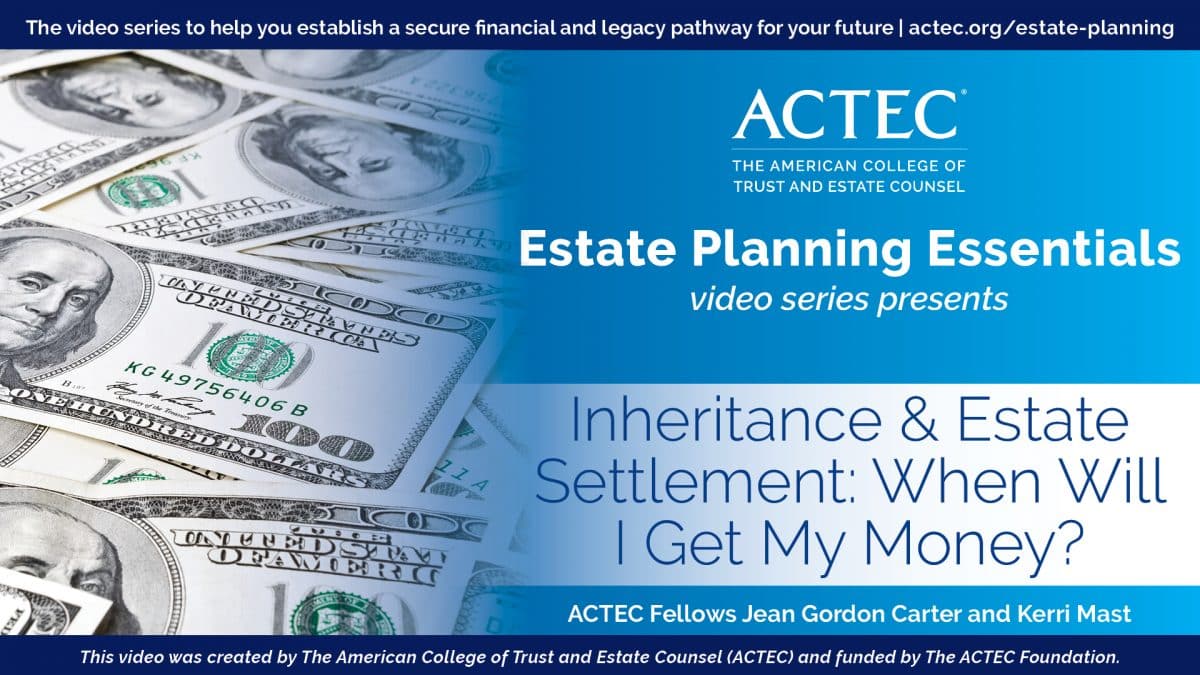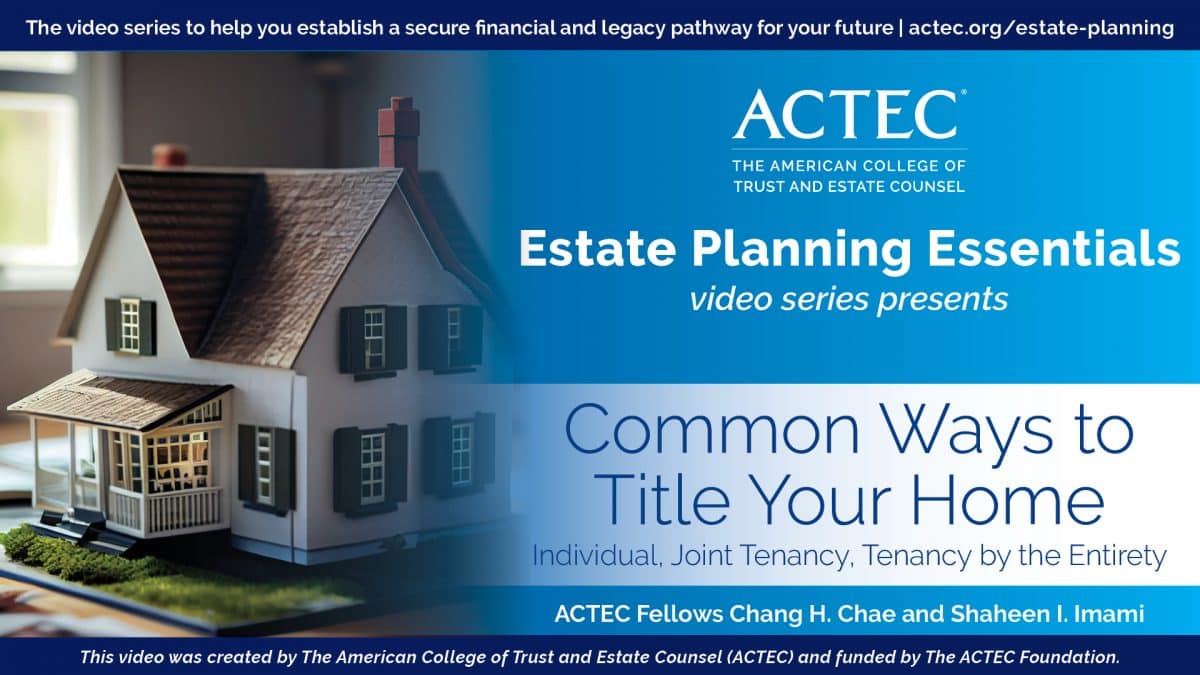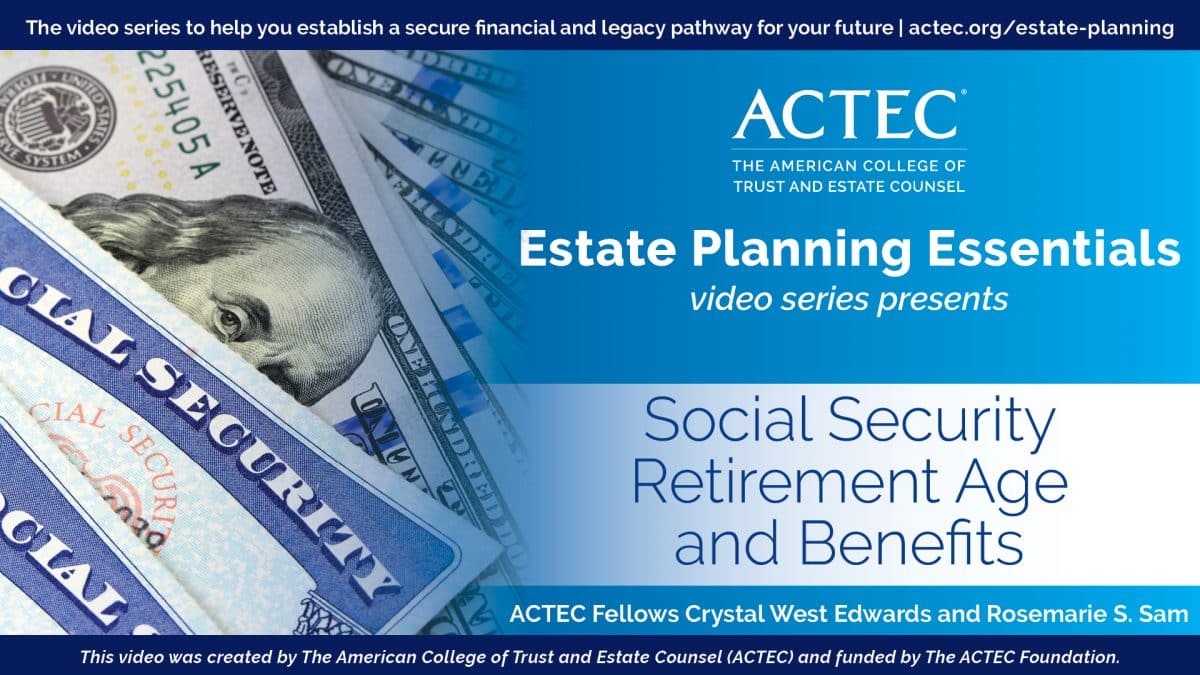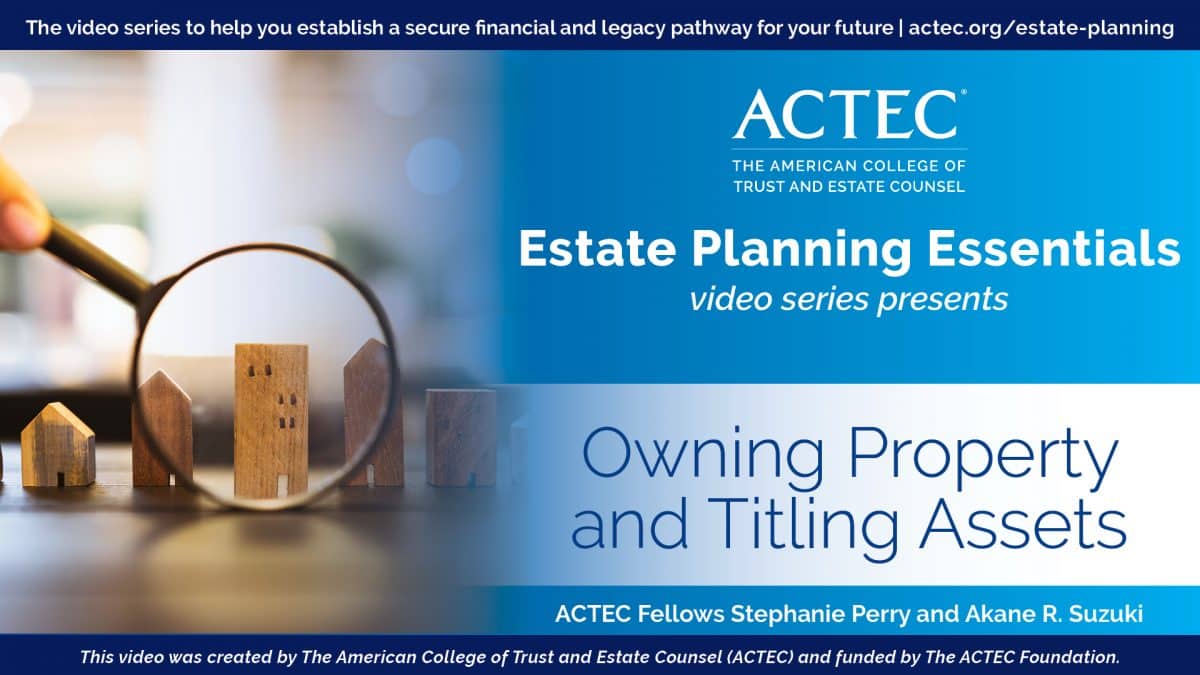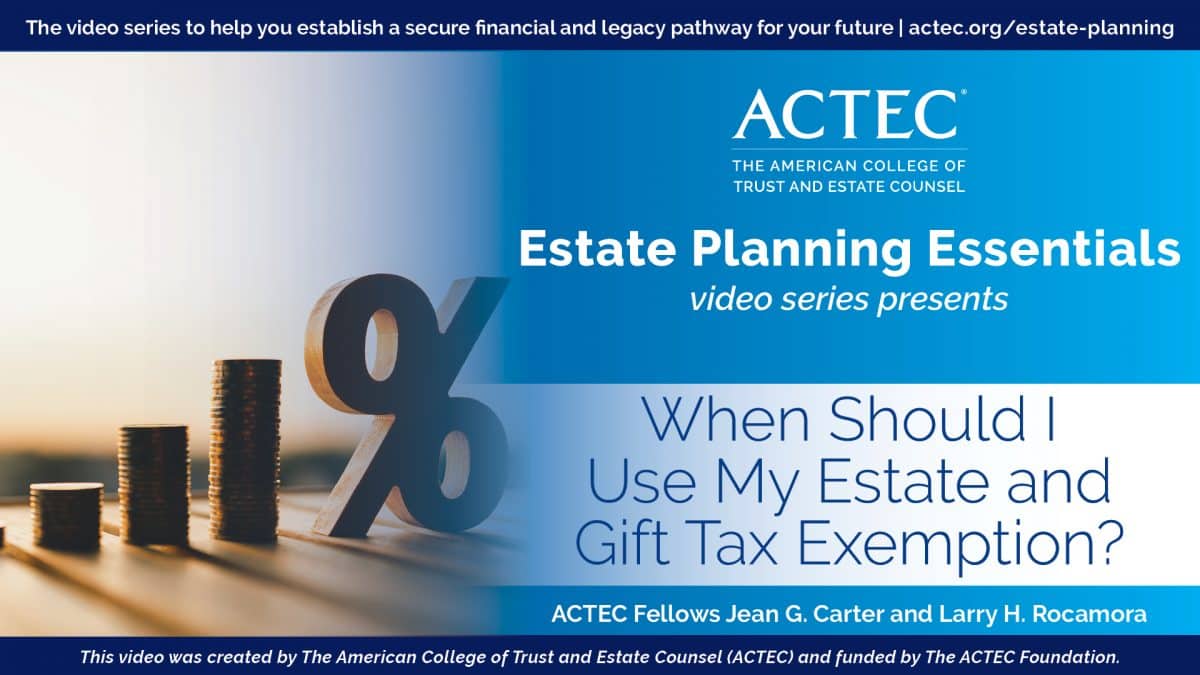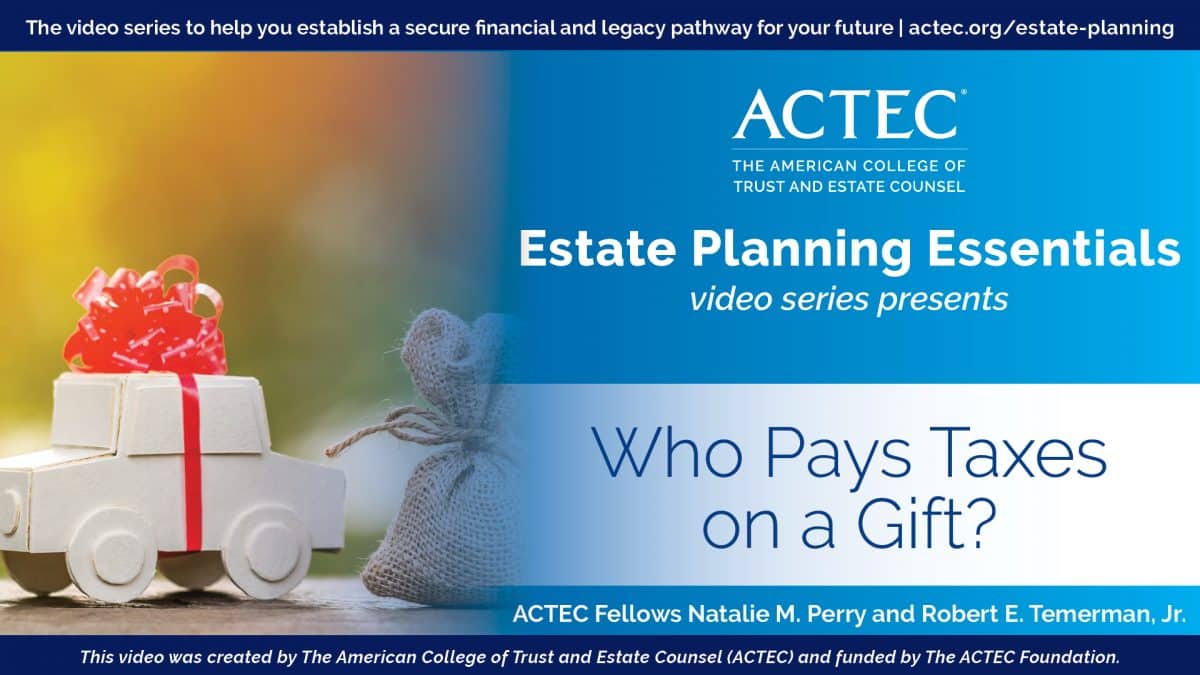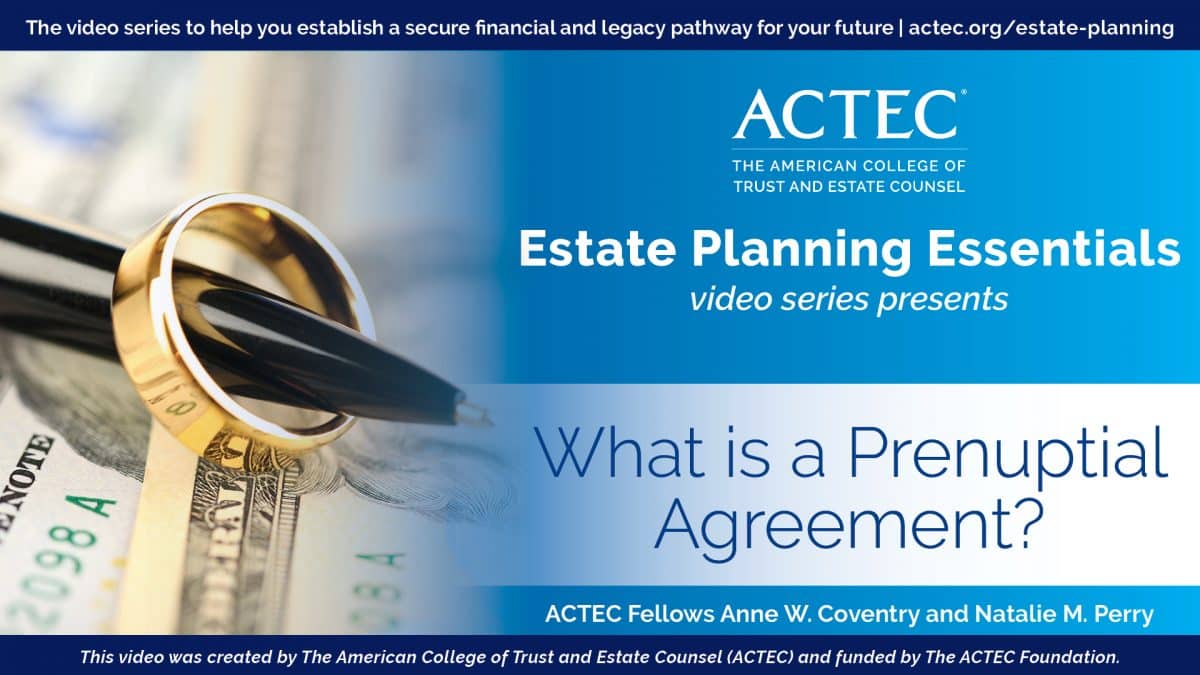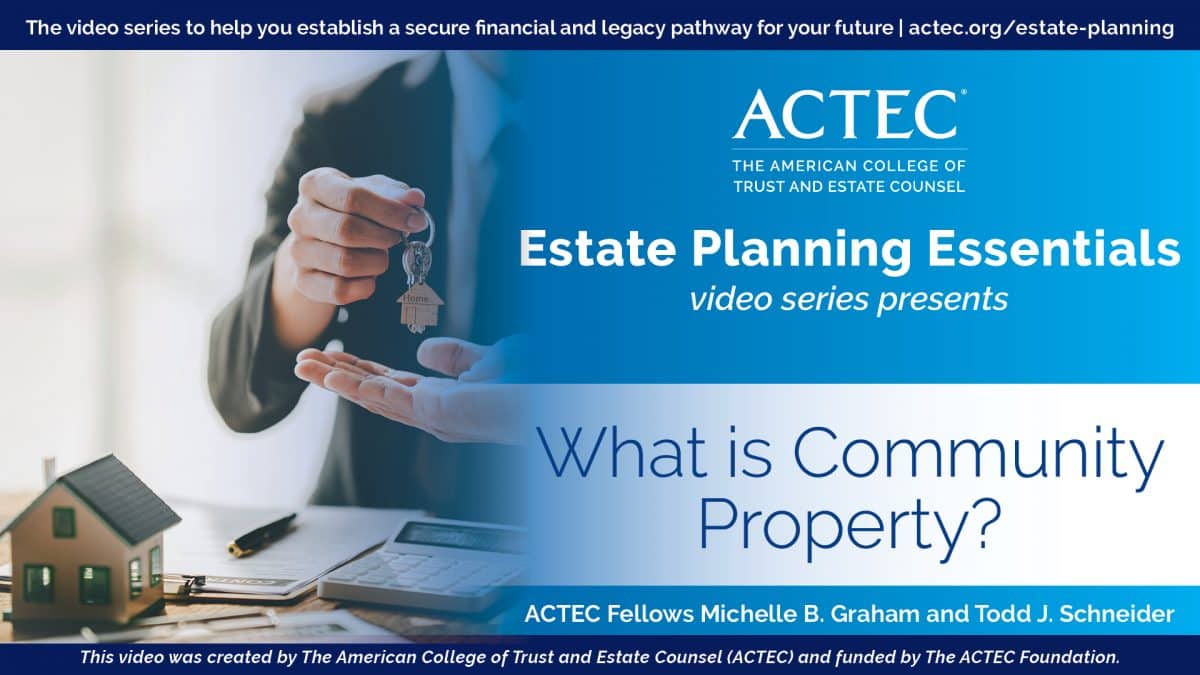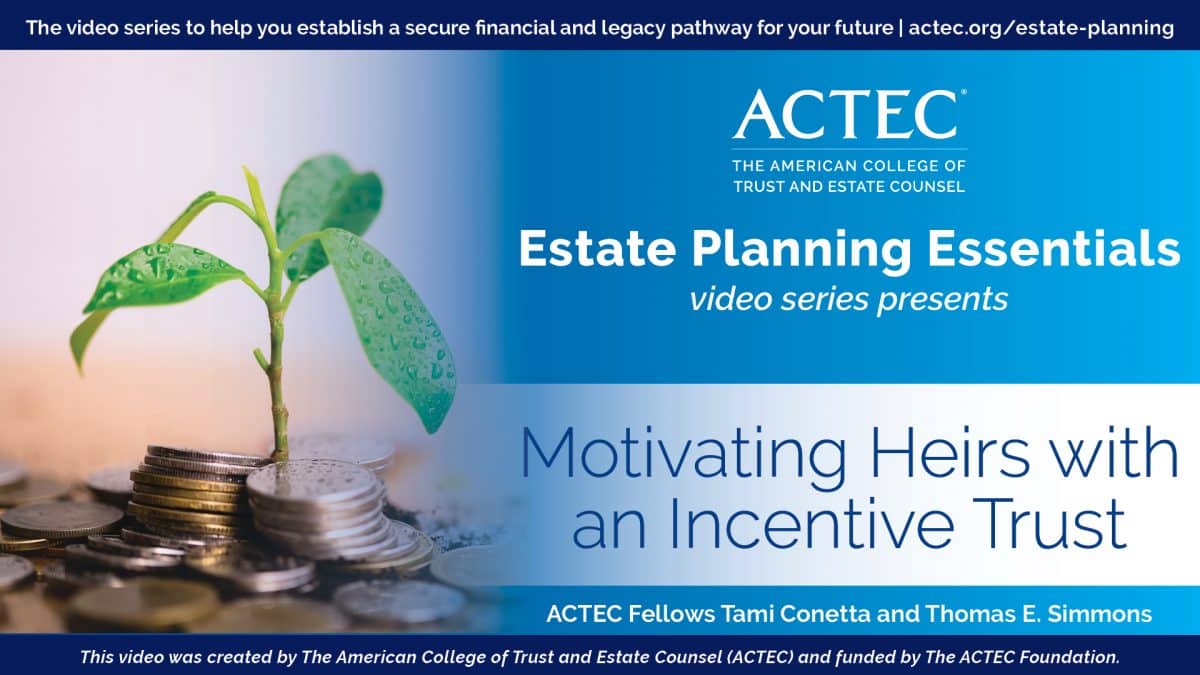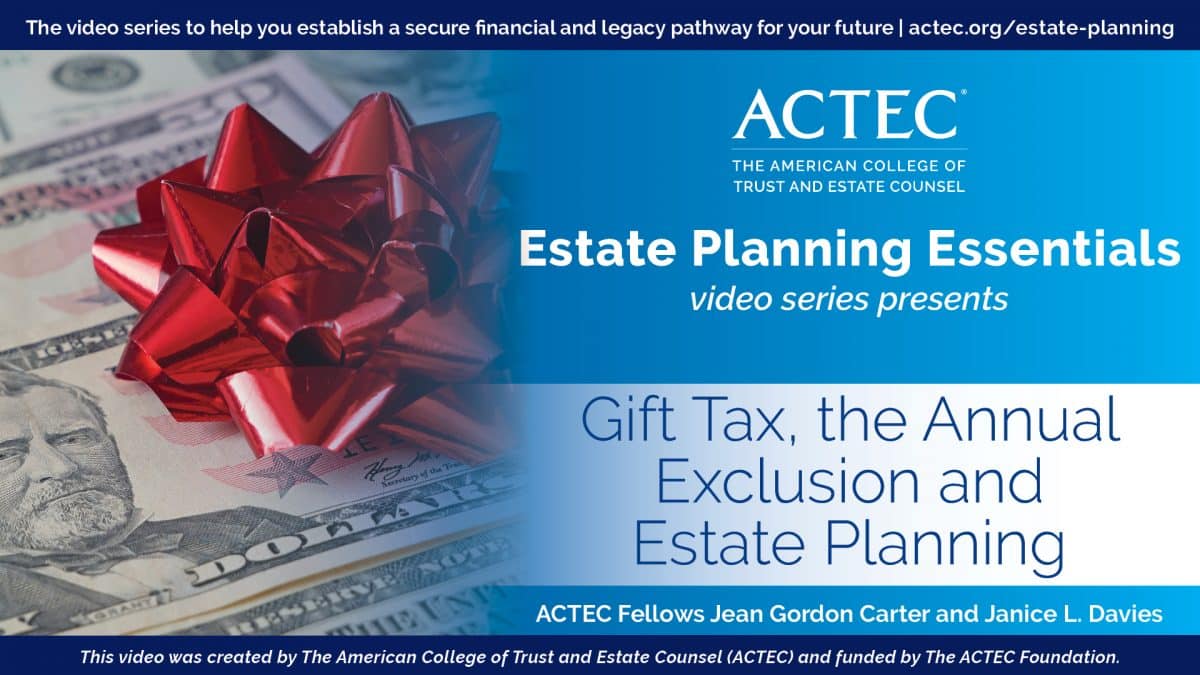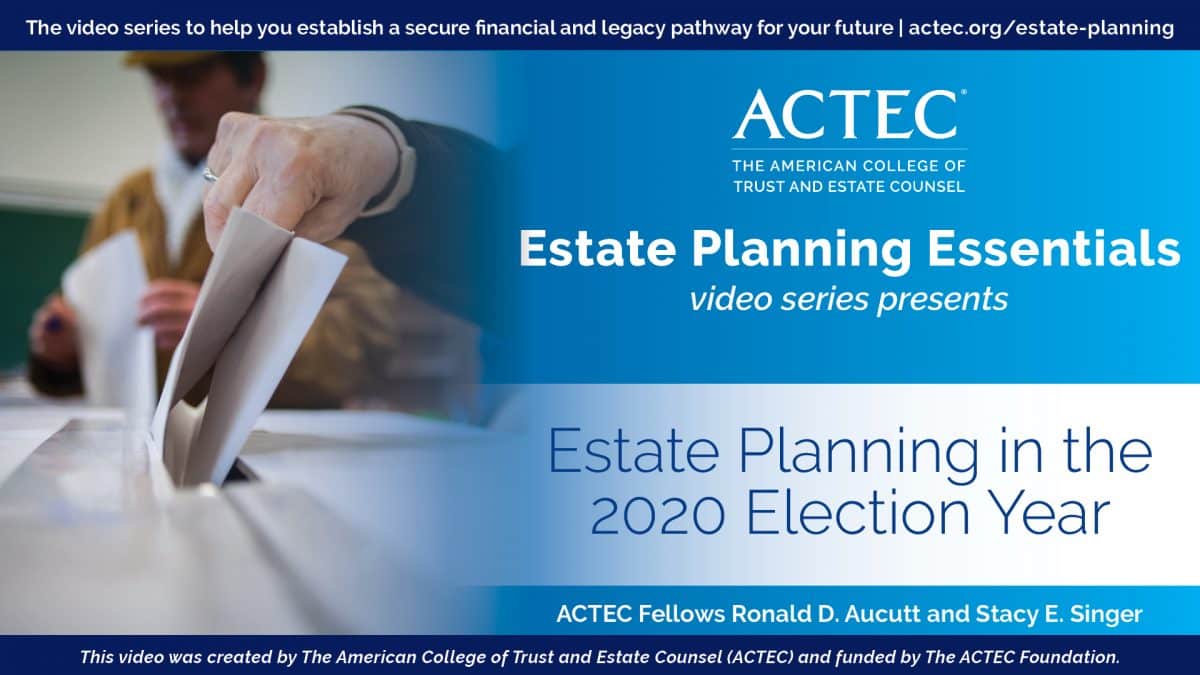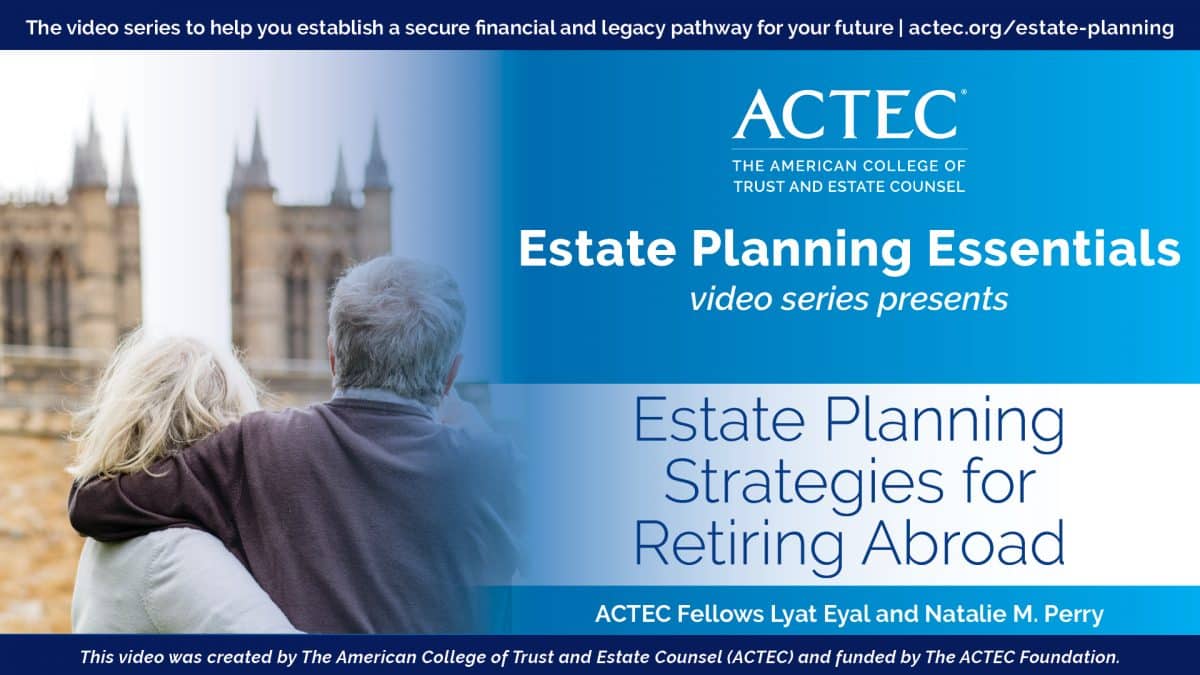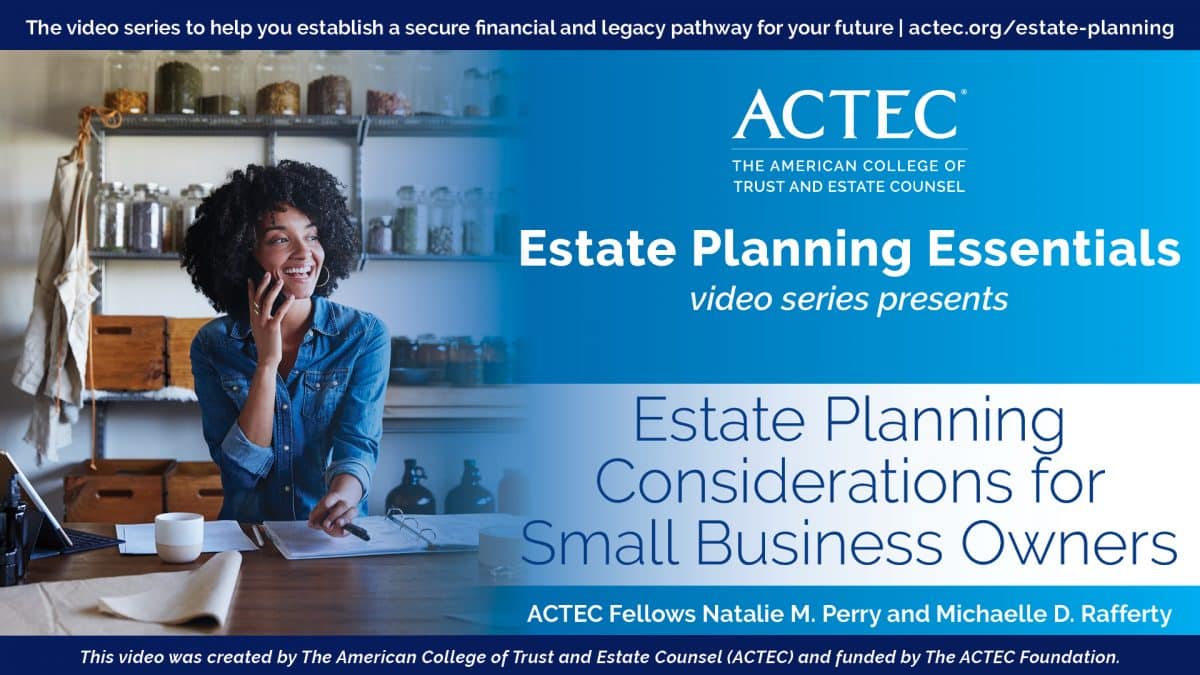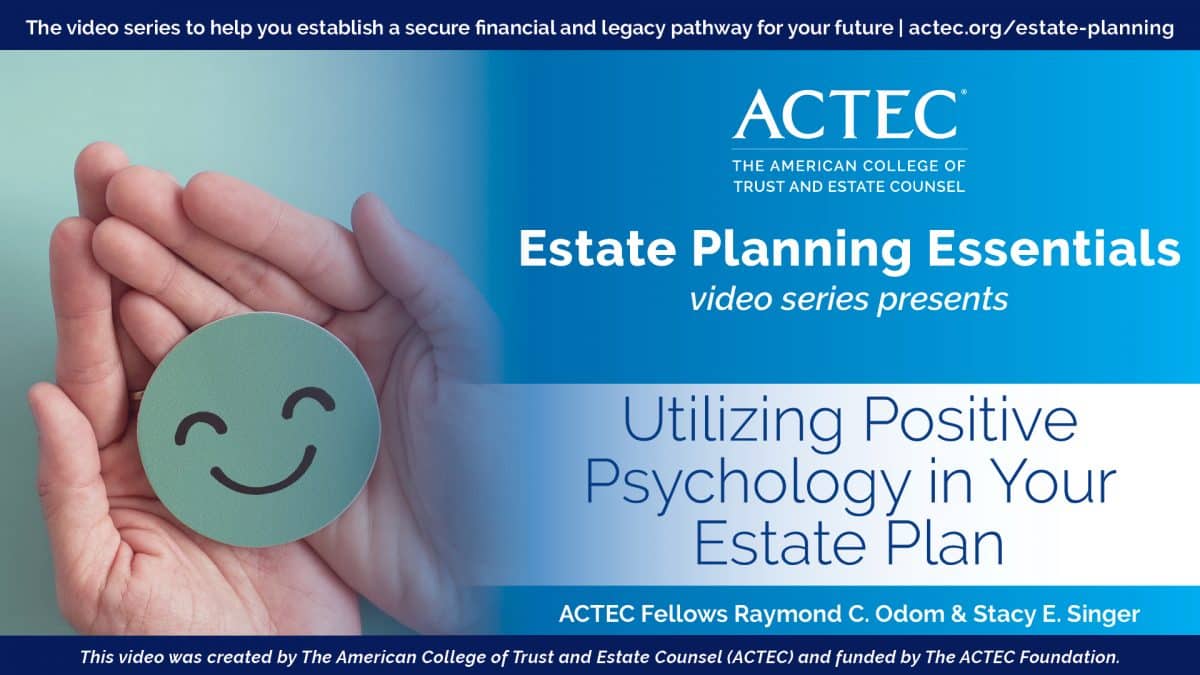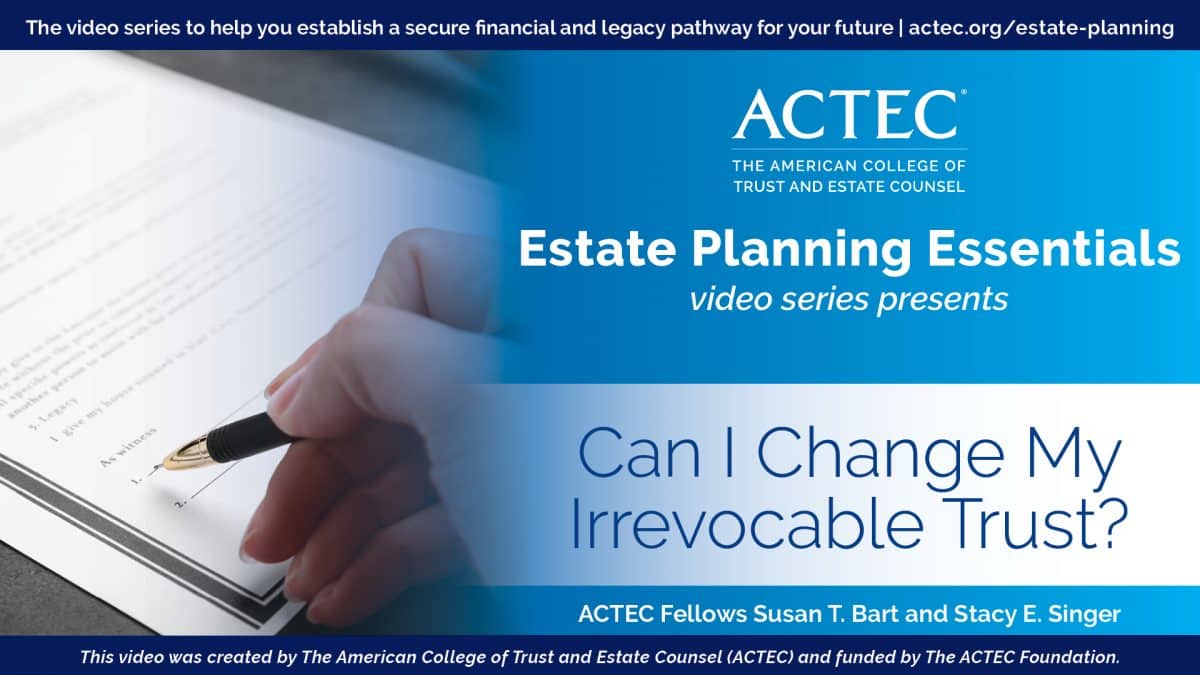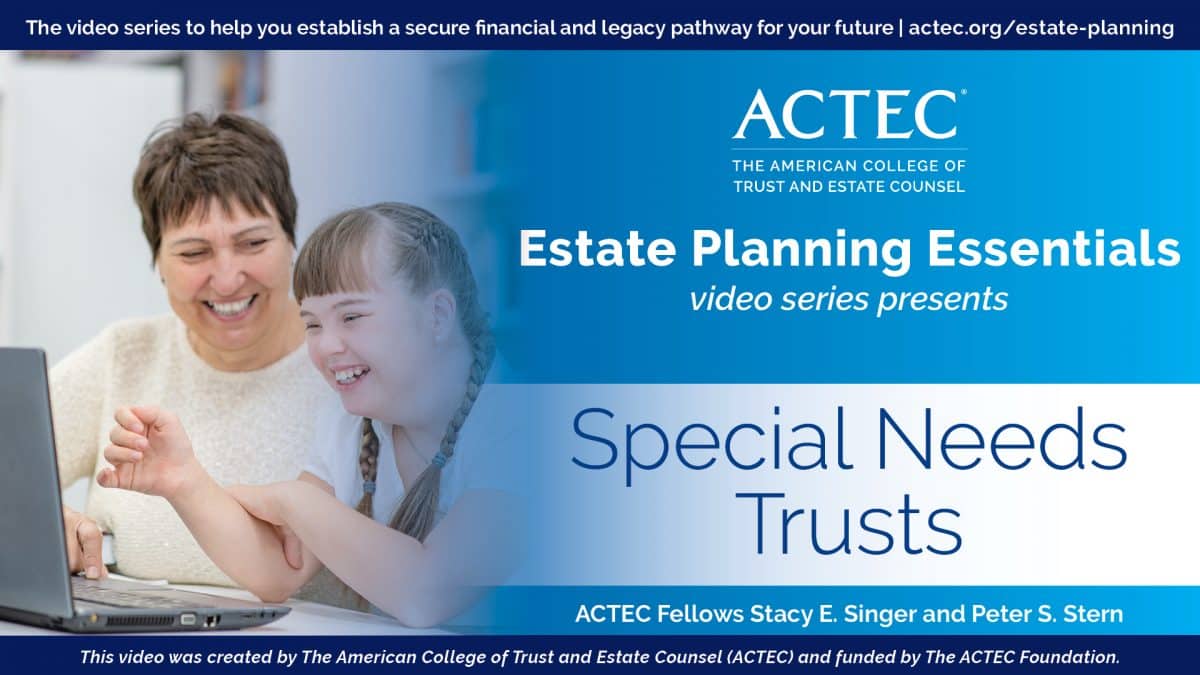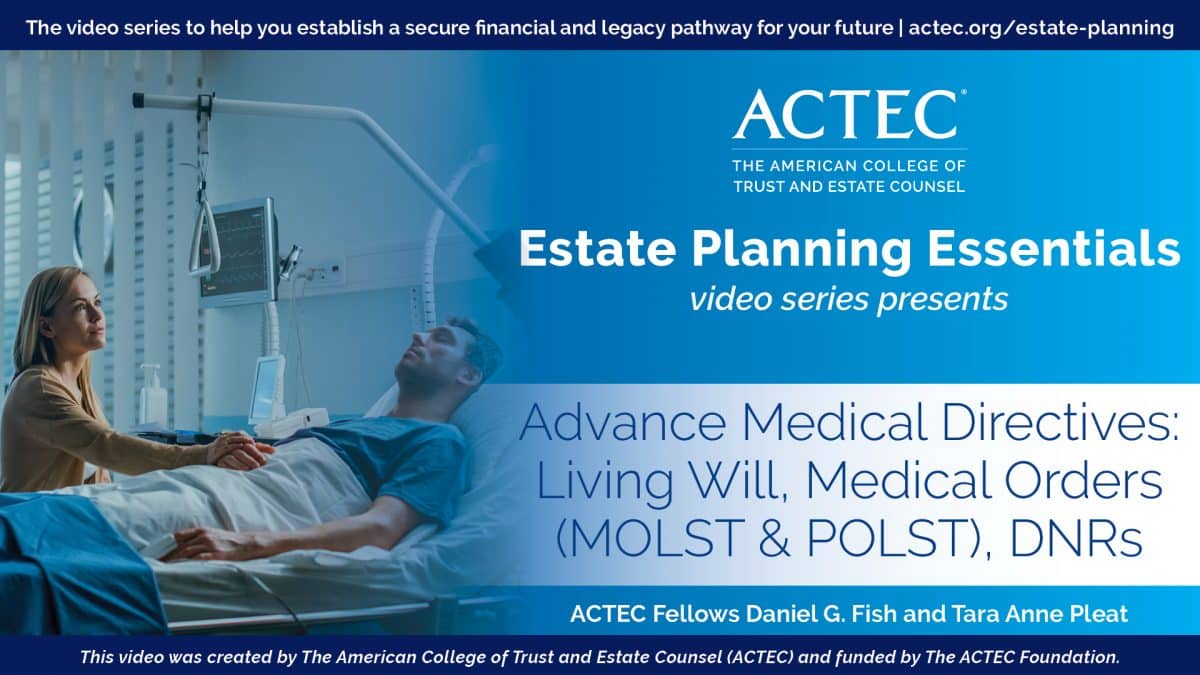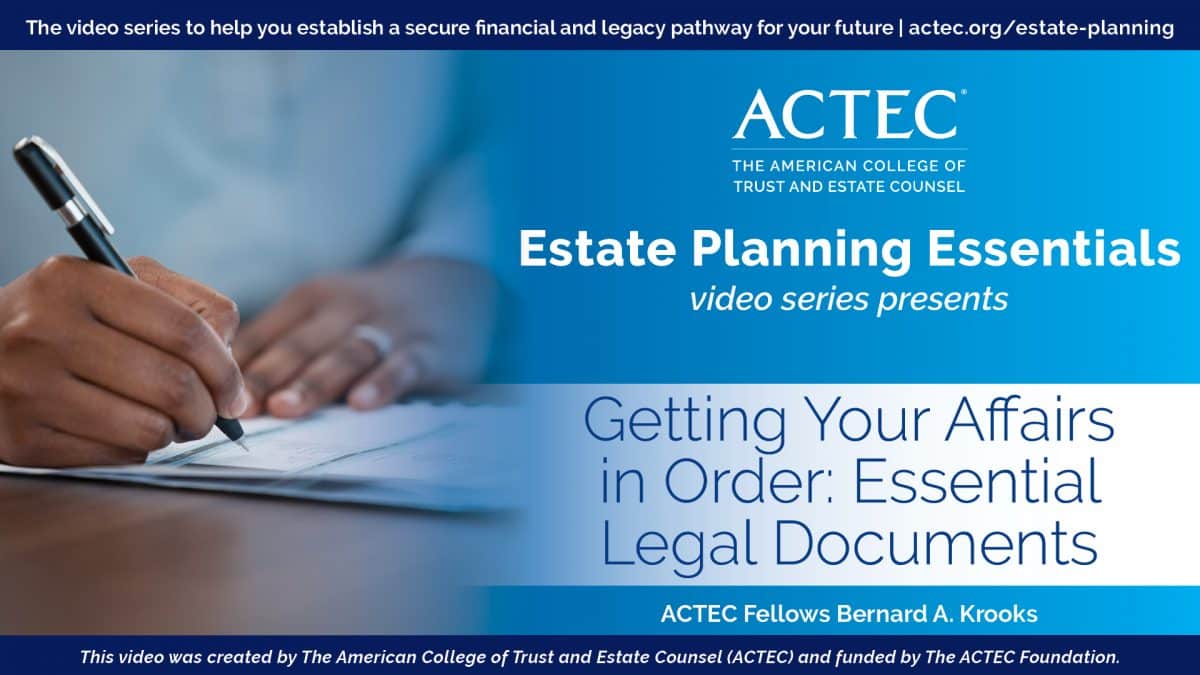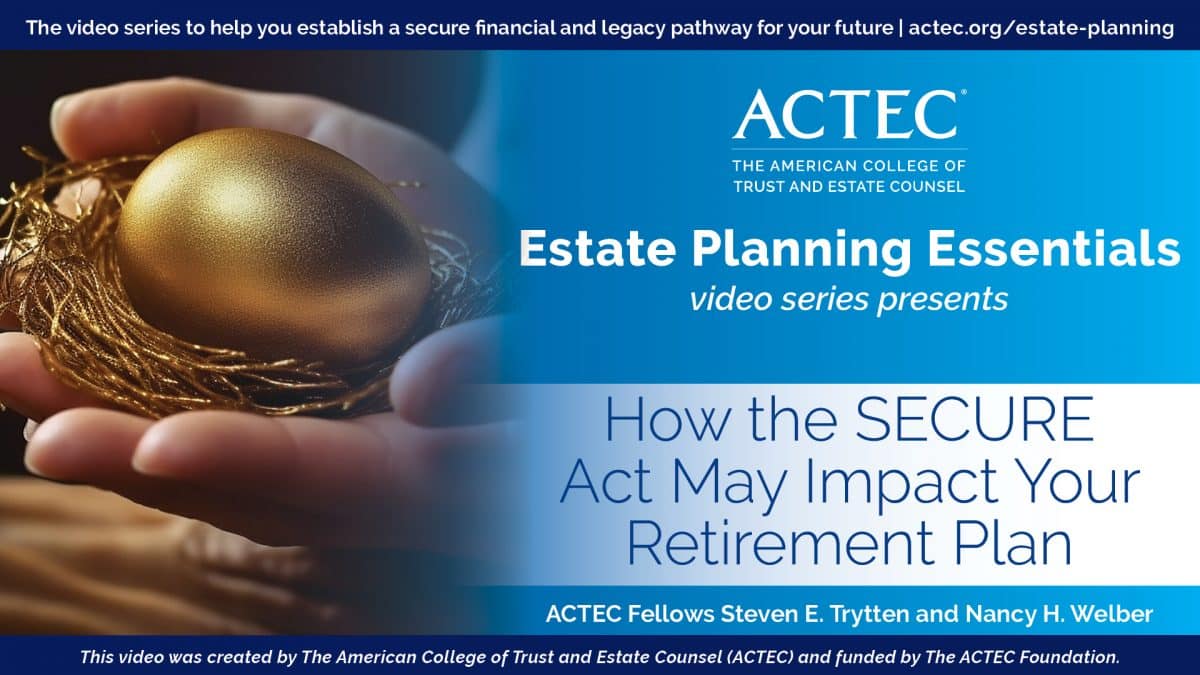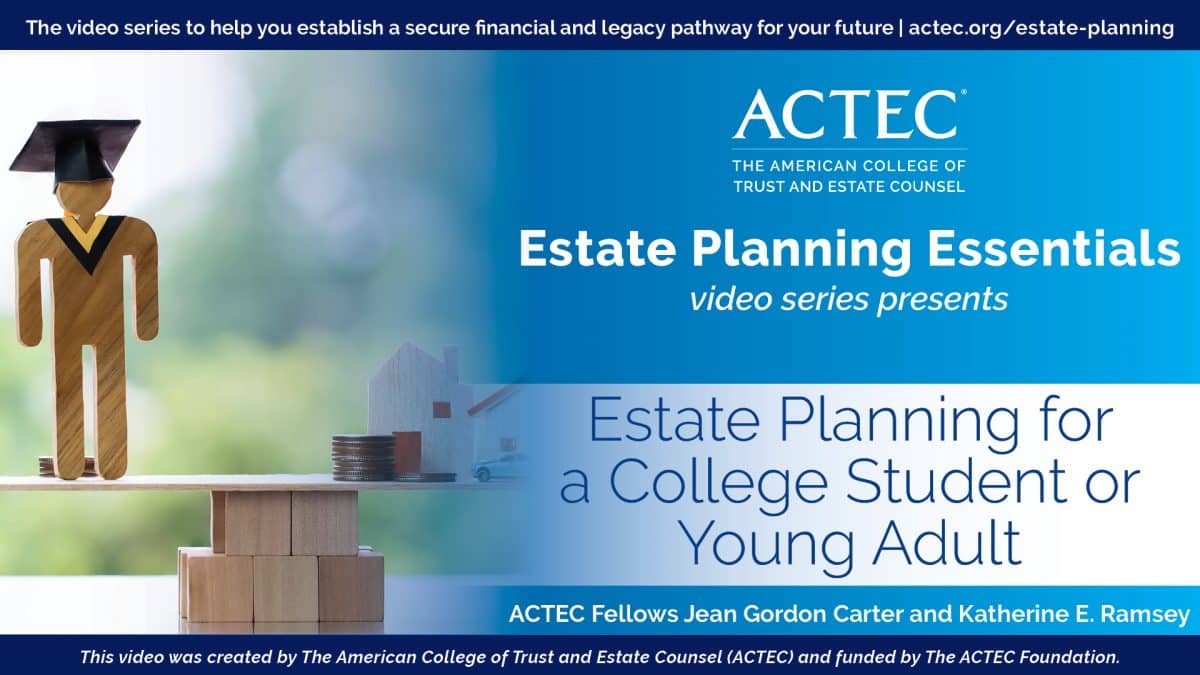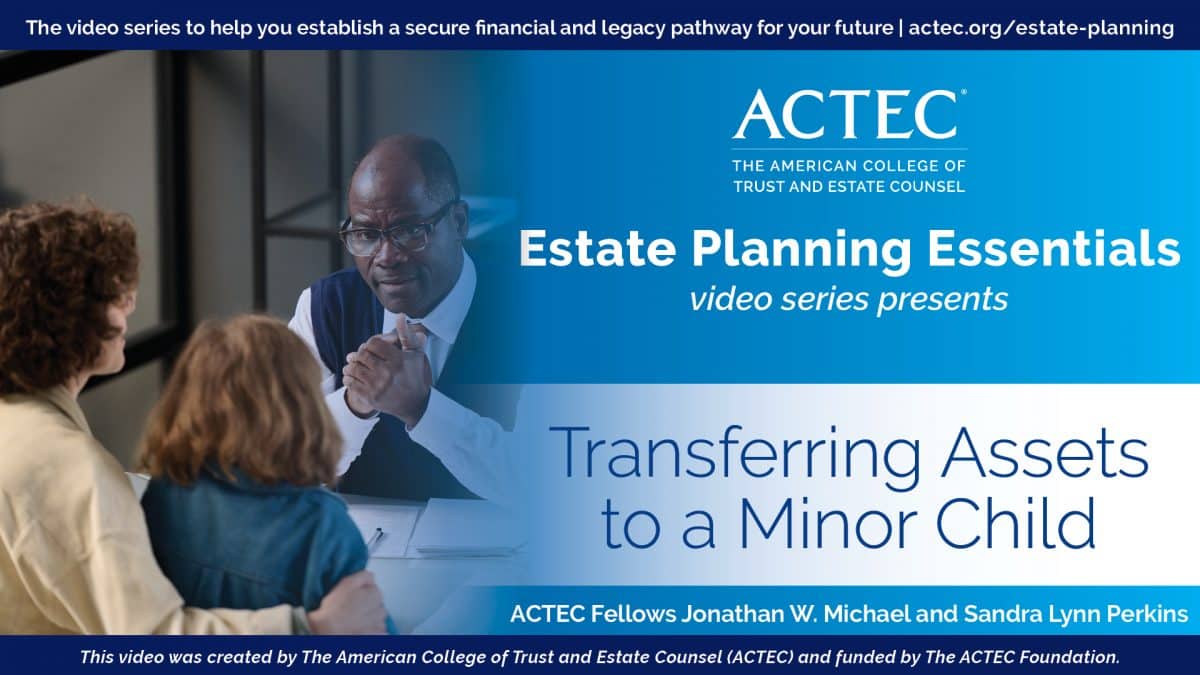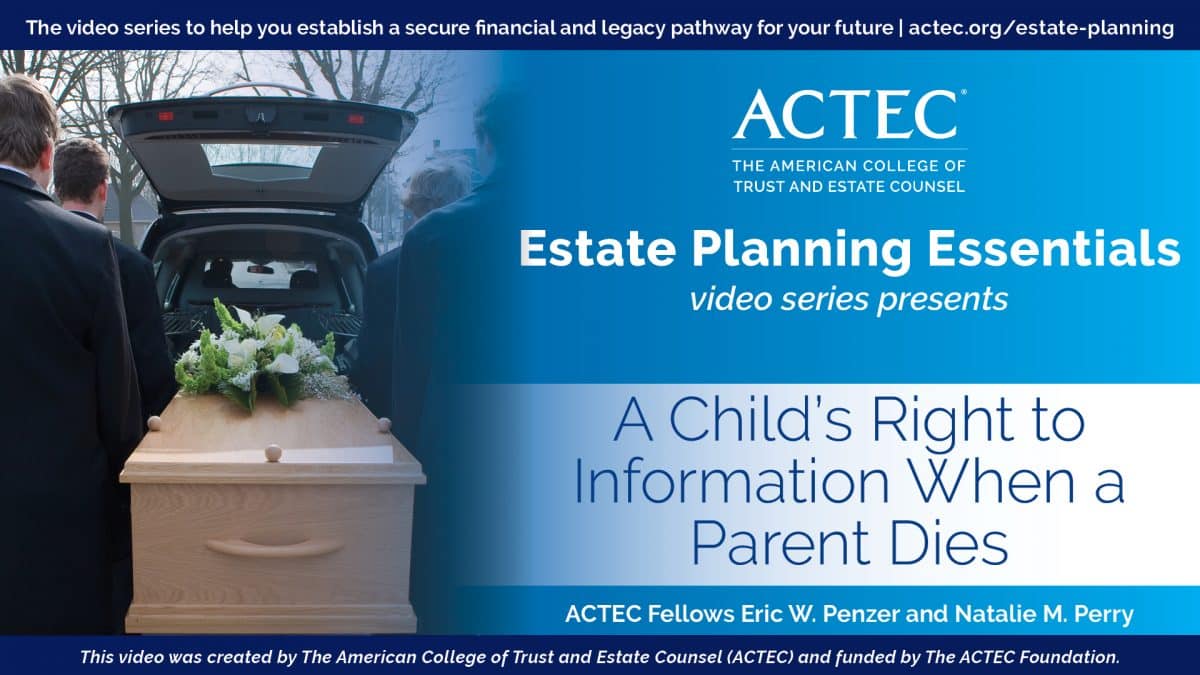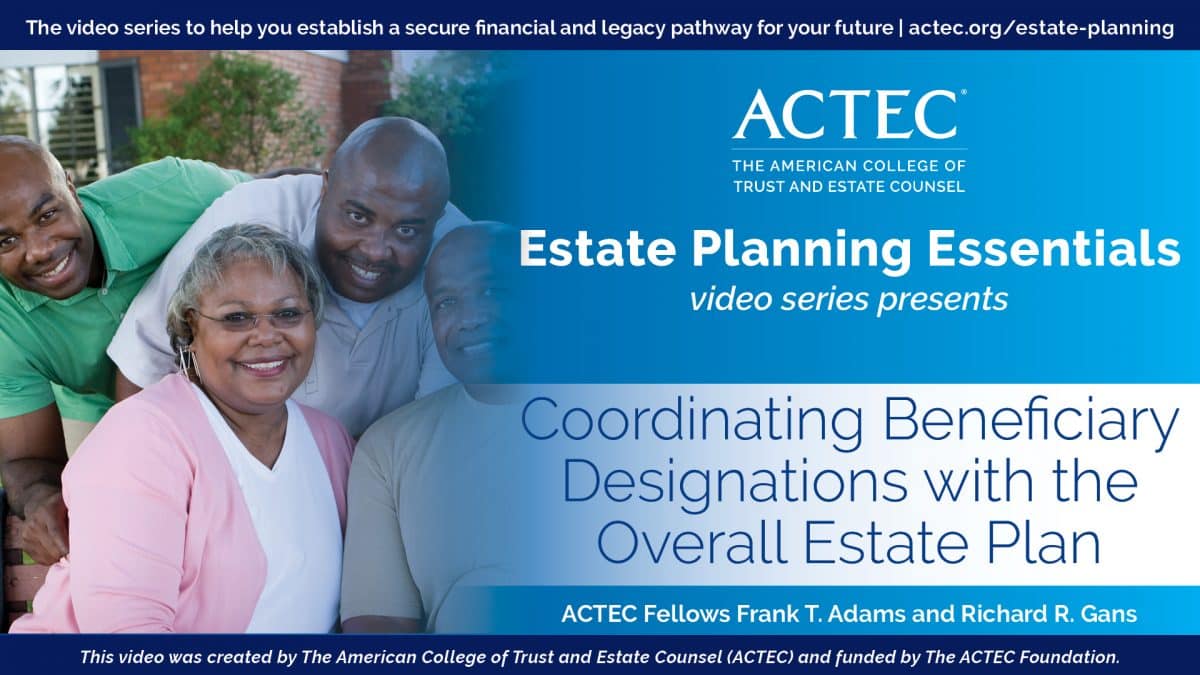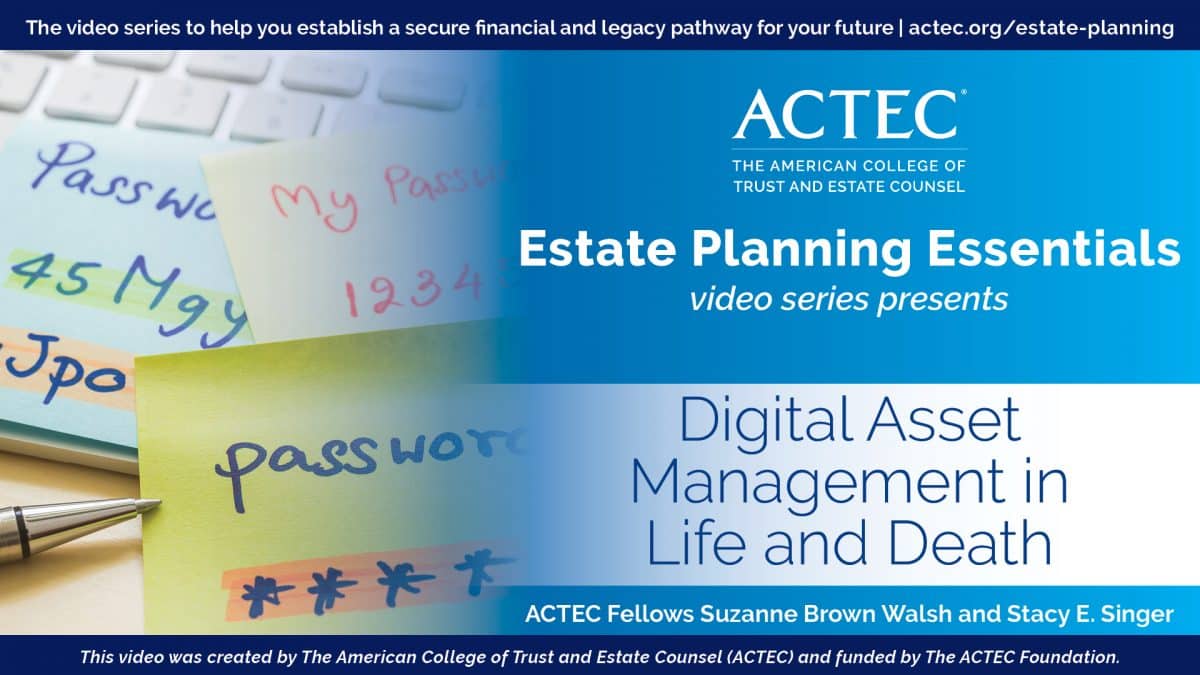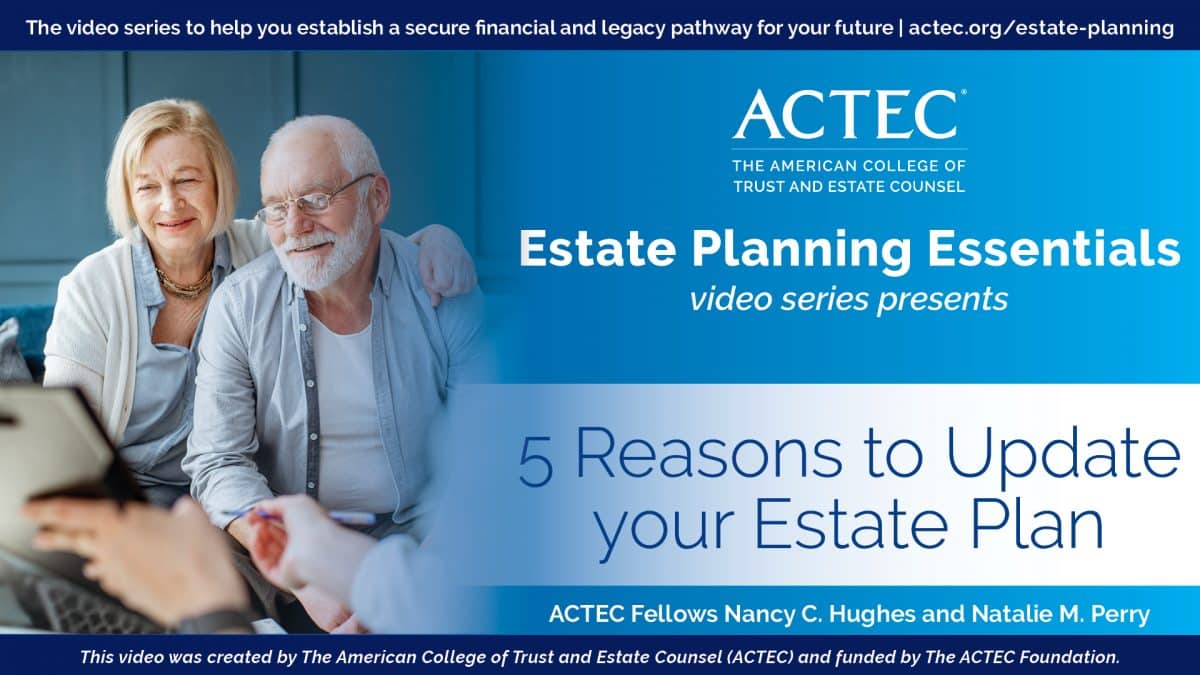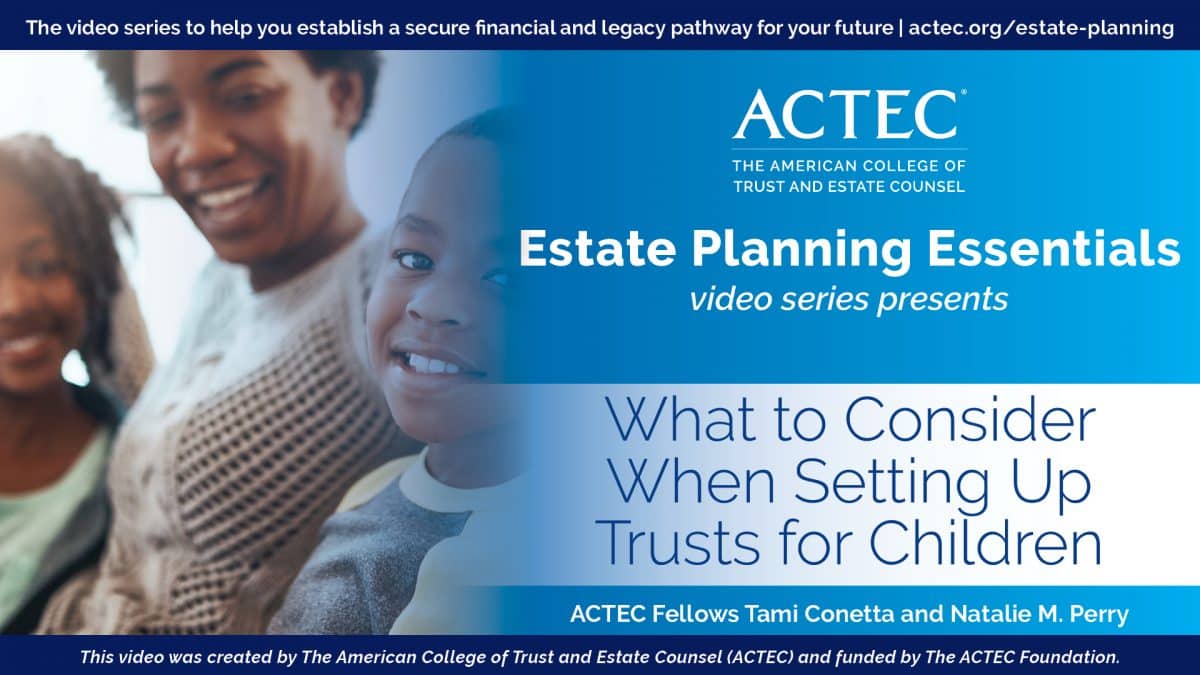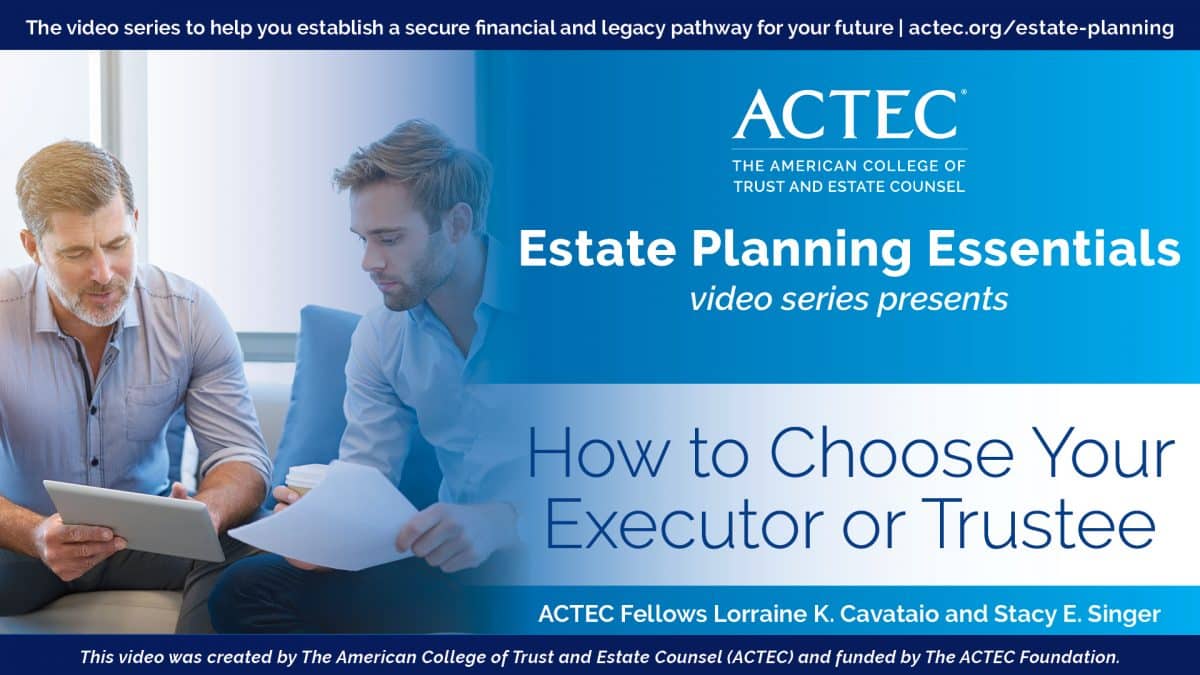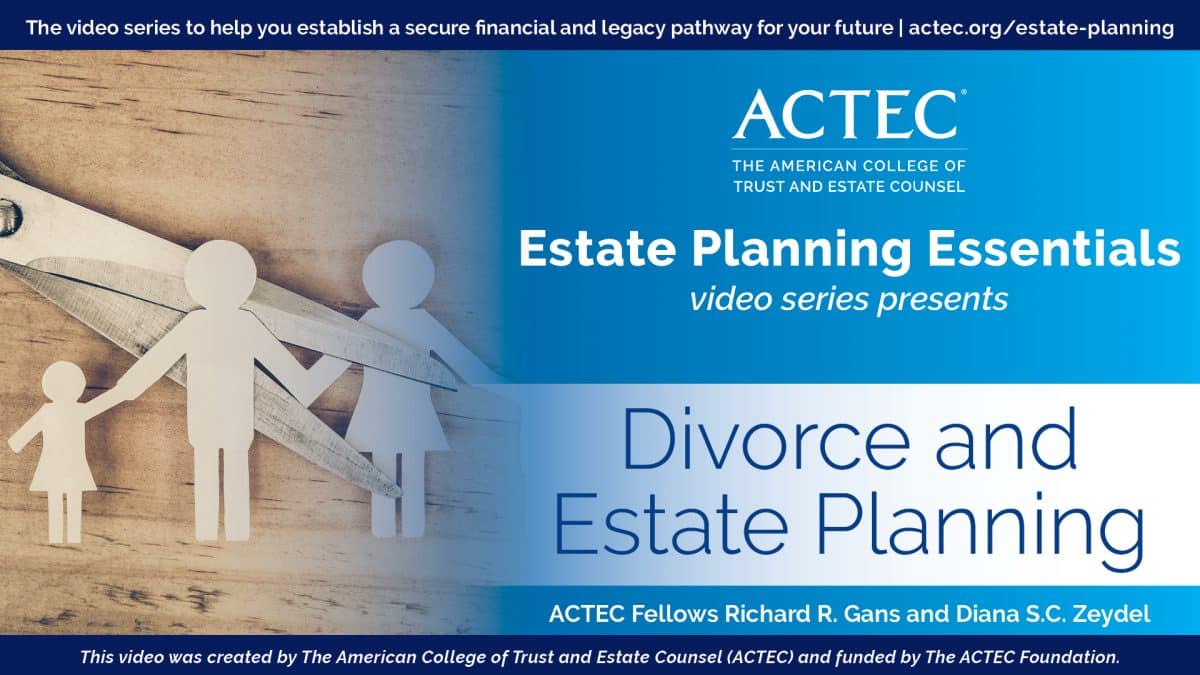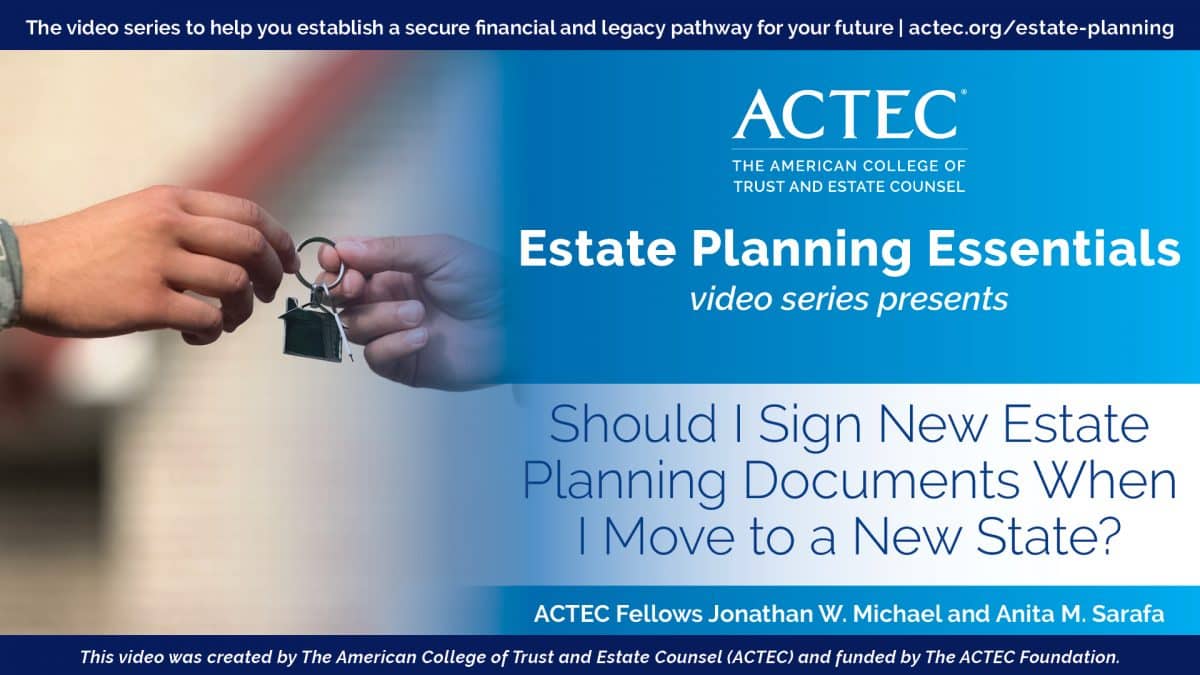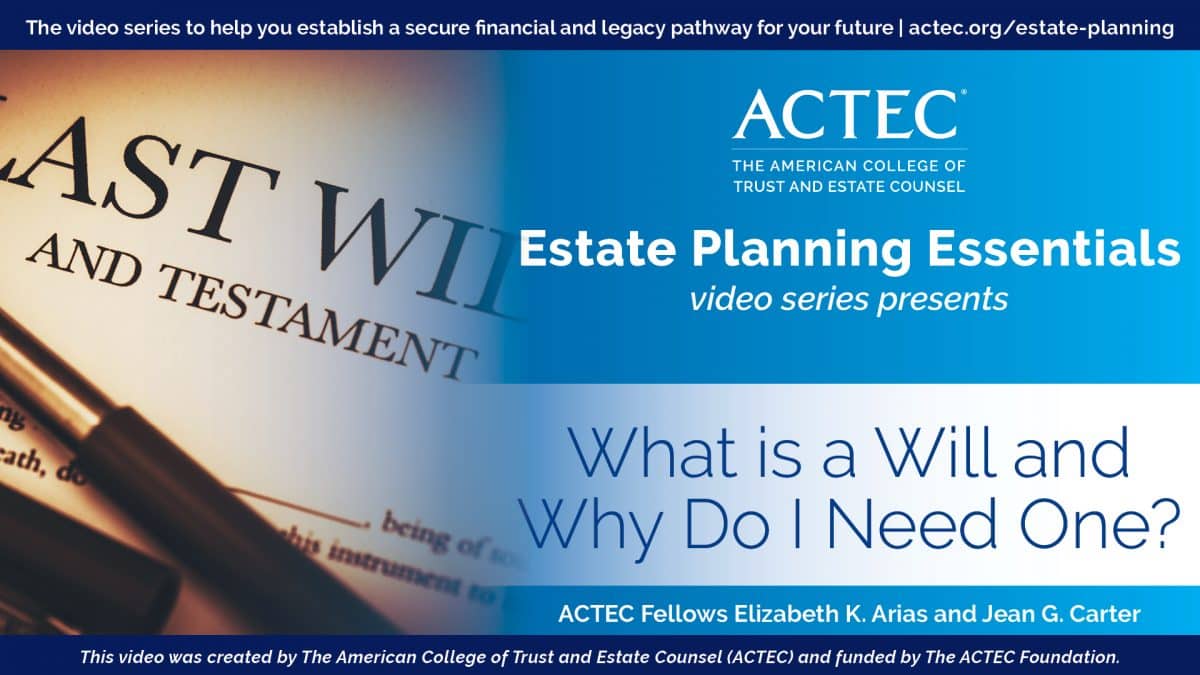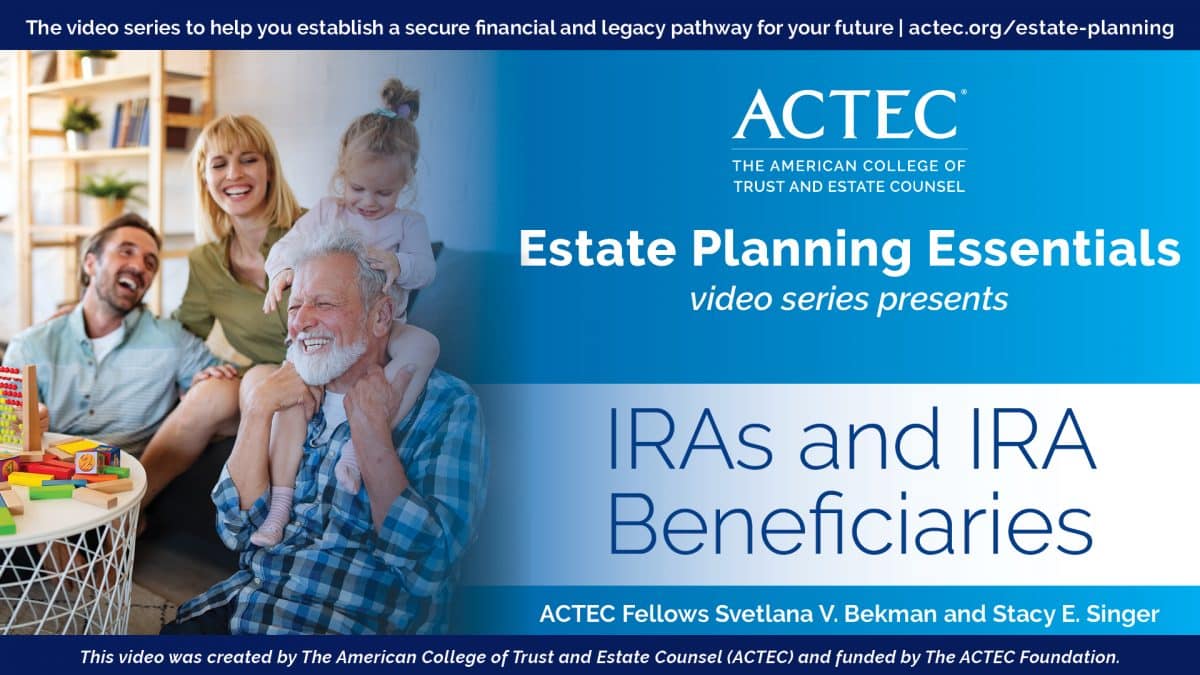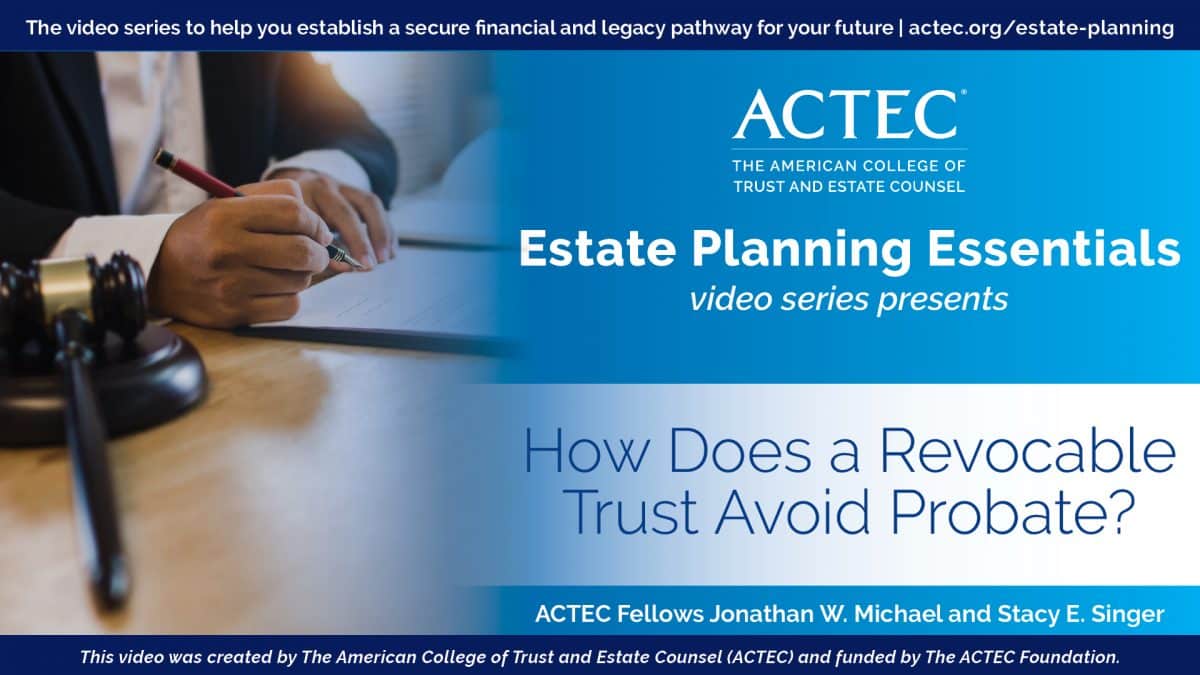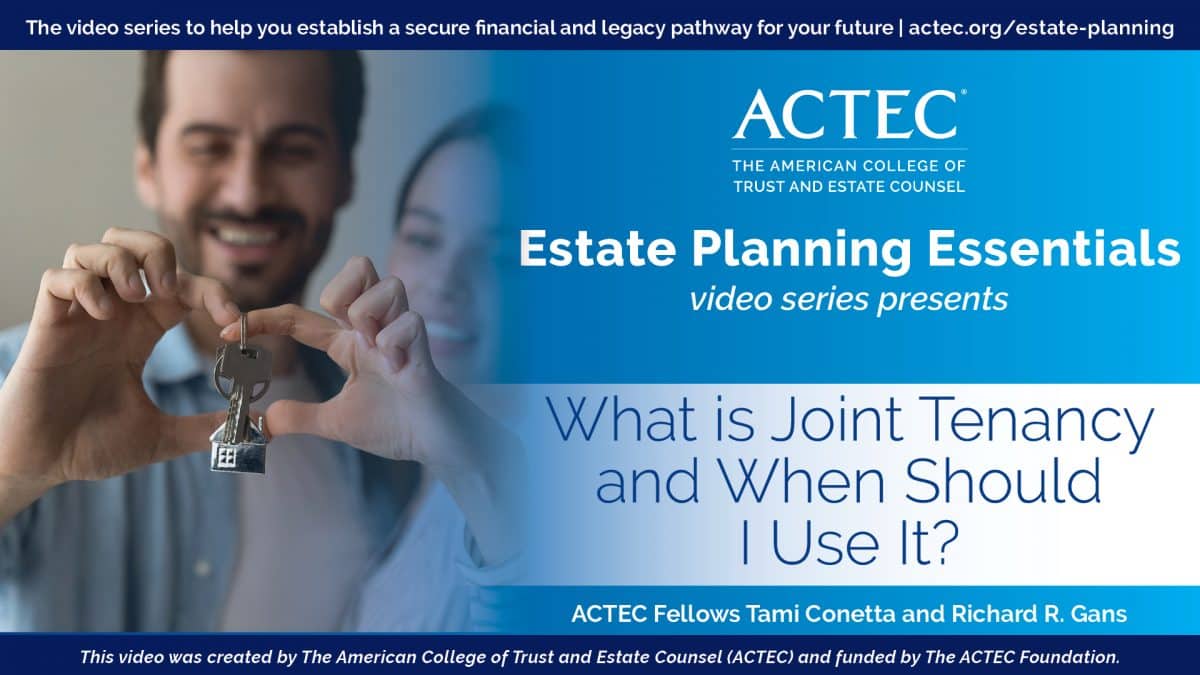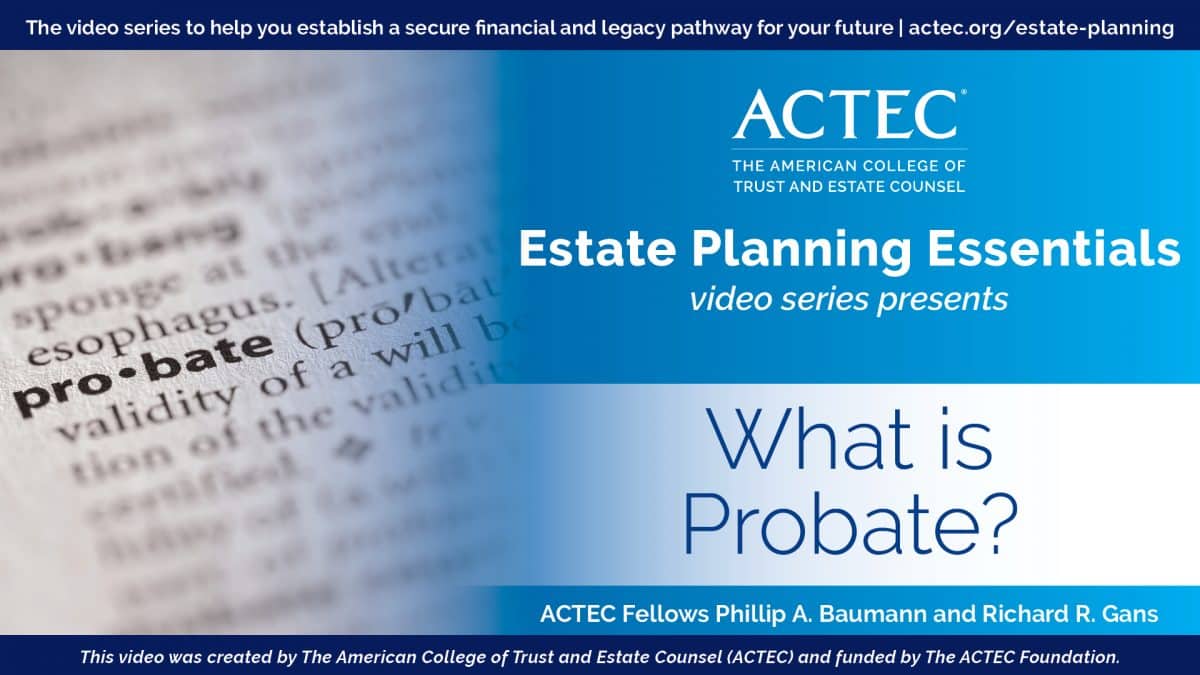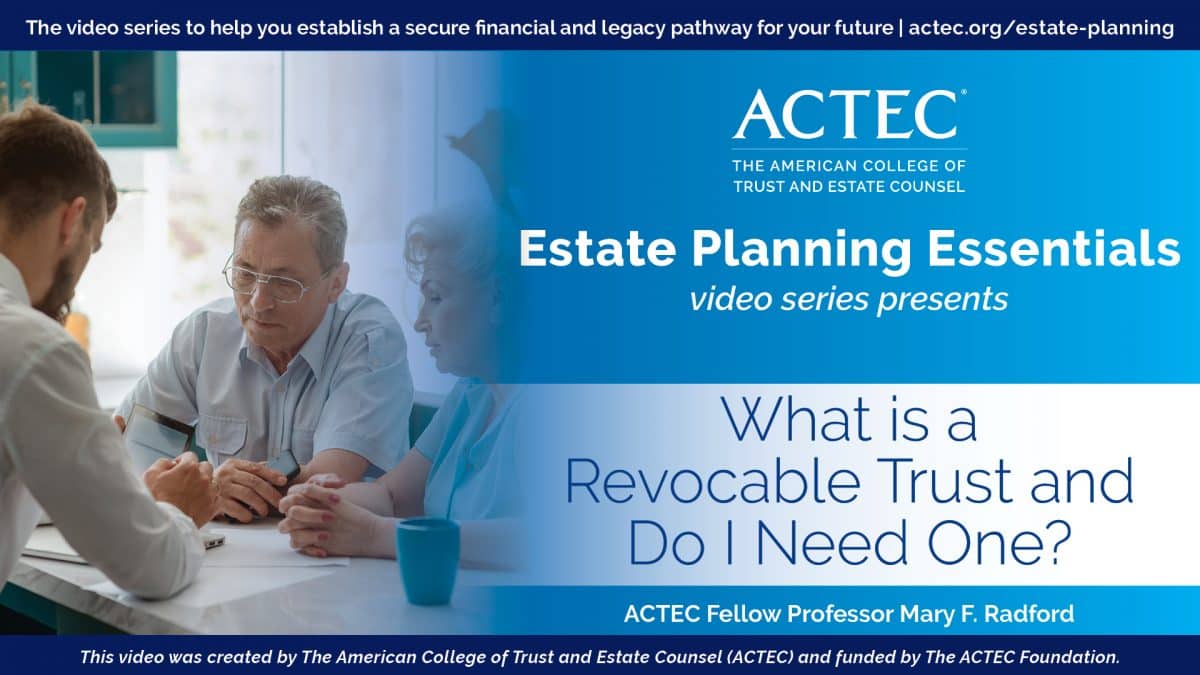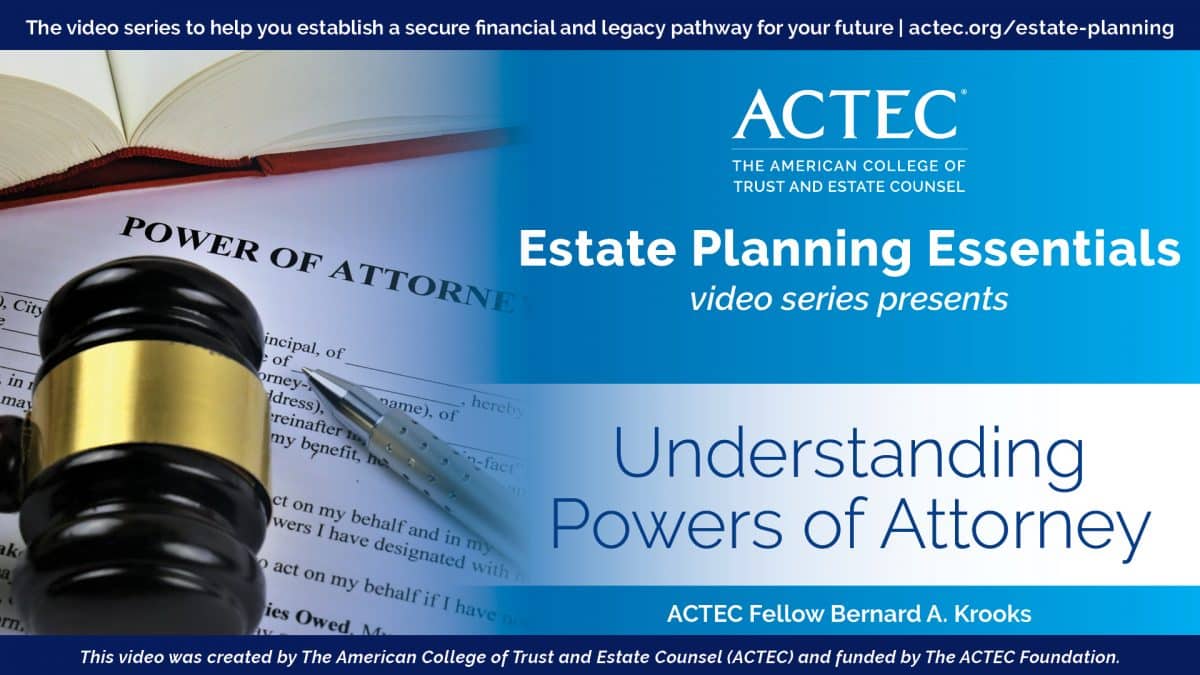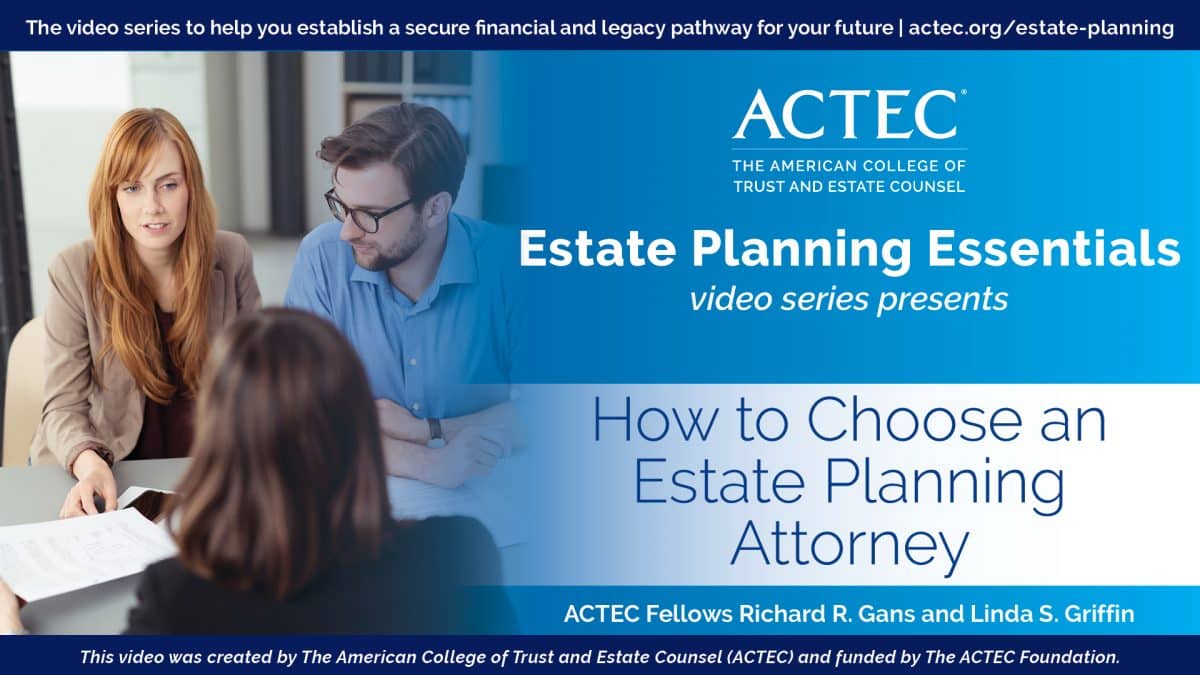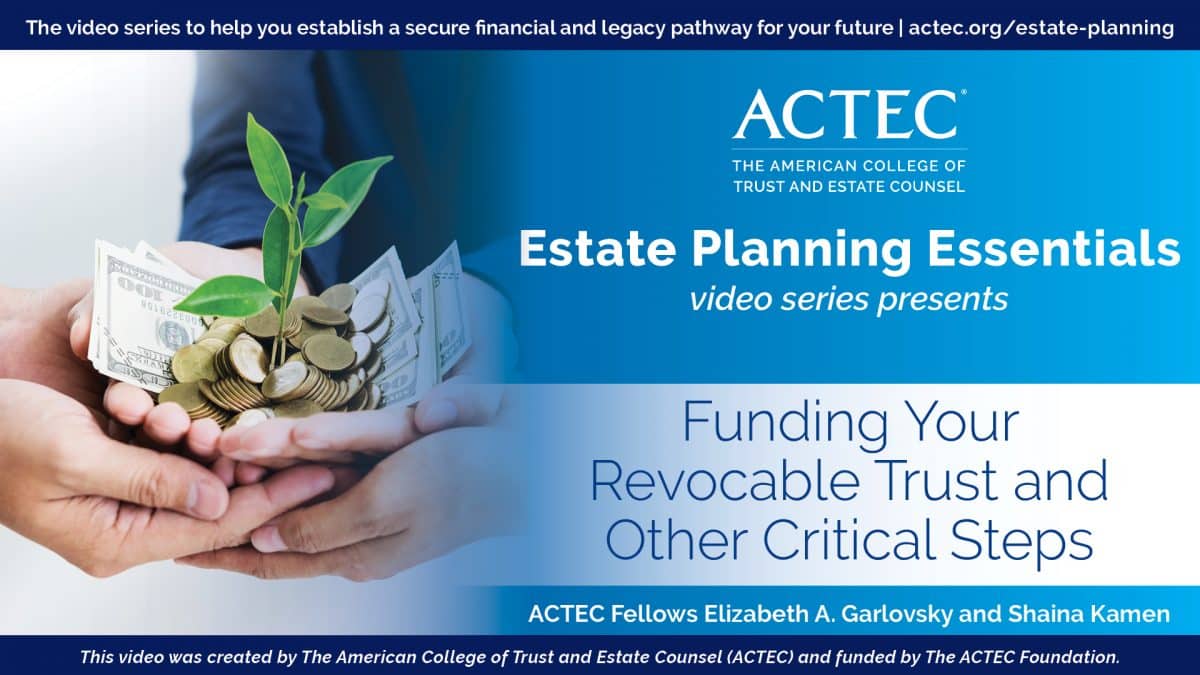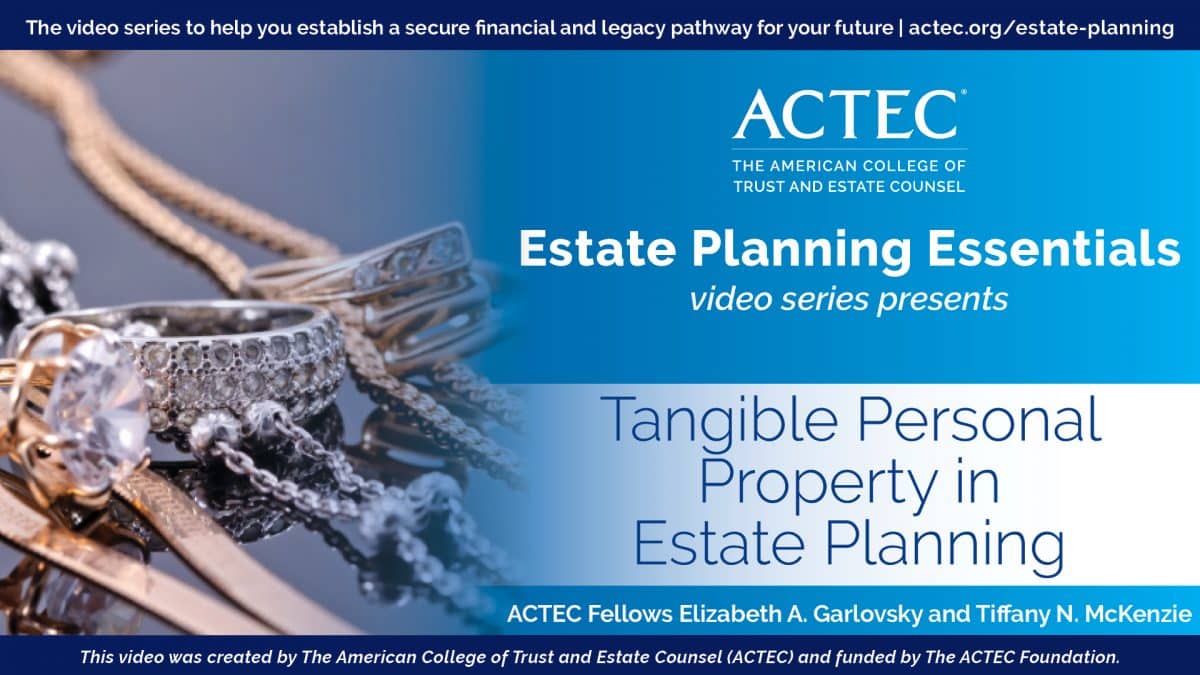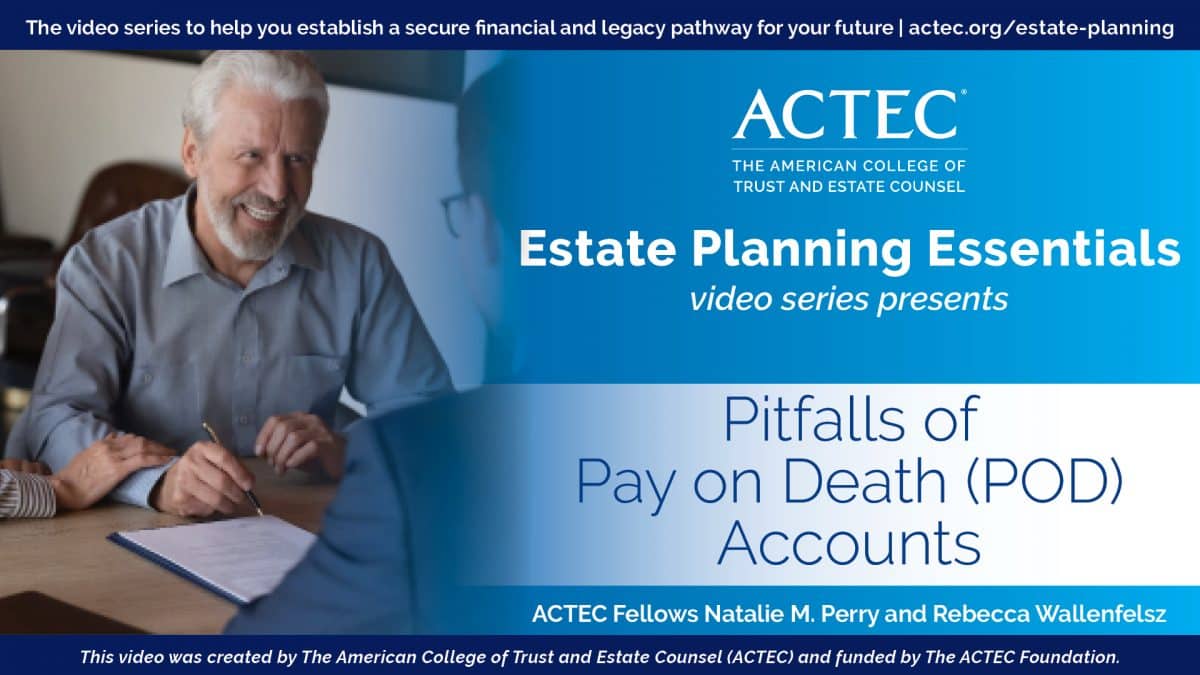Explore the library for expert trust & estate guidance.
ACTEC Estate Planning Essentials is a comprehensive resource provided by the American College of Trust and Estate Counsel (ACTEC) that offers guidance and information on various aspects of estate planning. It covers topics such as wills, trusts, estate tax planning, asset protection, retirement assets, charitable giving, and more. The video series aims to educate individuals and families about the key considerations and options available when creating an estate plan, helping them make informed decisions to protect their assets and plan for the future.
Estate Planning Videos
ACTEC Estate Planning Essentials is a comprehensive resource provided by the American College of Trust and Estate Counsel (ACTEC) that offers guidance and information on various aspects of estate planning.
ACTEC Estate Planning Essentials series was a recipient of the 2022 Communicator Award.
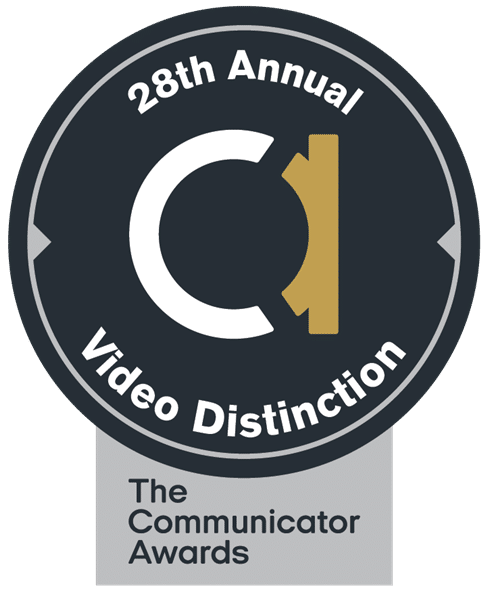
-
Use of Artificial Intelligence (AI) in Creating an Estate Plan
Discover the pros and cons of using AI in estate planning with Professor Gerry Beyer and attorney, Natalie Perry. Learn why expert legal advice is crucial.
-
The Dissatisfied Heir
Estate experts explain to heirs what they need to understand in an inheritance dispute, including their rights, contesting a will, and when to seek counsel.
-
Charitable Giving Tips & Tricks
A primer on donations, including tax considerations, donating stocks vs. cash, “bunching” donations, donor-advised funds (DAF), and more.
-
Artificial Intelligence (AI) and Planning Your Estate
Estate planning attorneys explain what consumers should be aware of when using AI and what their lawyer’s professional responsibilities should include.
-
Estate Planning for Freelancers and the Gig Economy
Explore estate planning for freelancers and gig workers. Learn about tax planning, creating a will, asset management, planning for incapacity, and more.
-
Should I Serve as an Agent Under a Financial Power of Attorney (POA)?
Understand what’s involved in the role of a property or financial power of attorney (POA), what’s entailed, and what questions you should ask yourself.
-
Should I Serve as a Trustee?
Attorneys explain the responsibilities and risks of being a trustee of a trust, a role that involves significant legal and ethical obligations.
-
Should I Serve as an Executor?
Estate attorneys explain what individuals need to understand before agreeing to serve as an estate executor, such as probate, tax, and legal requirements.
-
Tips for Seniors to Avoid Scams
Legal experts explain common scams against senior citizens, offer tips to avoid scams and outline steps to take if you are the victim of elder fraud.
-
Managing Guns in Your Estate
Estate planning experts explain the complexity of transferring firearms and guns in your will and offer tips regarding what to consider when bequeathing weapons.
-
Understanding Special Needs Trusts
Estate planning experts explain the different types of Special Needs Trusts (SNT) and offer tips to families to determine which one they should use.
-
Tips for Individuals Living Alone (Pt. 1 of 2)
Estate lawyers share tips for individuals living alone to prepare for a healthcare or medical emergency, including a checklist and contact forms in pt. 1 of 2.
-
Tips for Individuals Living Alone (Pt. 2 of 2)
Lawyers share tips for individuals living alone on planning for incapacity or illness and provide a review of critical power of attorney documents.
-
Preparing for Your Initial Estate Planning Meeting
Experts in estate planning explain what information and documents clients must provide to an attorney during the initial meeting to be efficient with time.
-
Common IRA Beneficiary Scenarios
There are no do-overs with IRA beneficiaries! Understand the typical IRA beneficiary scenarios and why reviewing every time you set up an IRA is critical.
-
Understanding Cryptocurrency in Estate Planning
Understand how to manage cryptocurrency in your estate and plan for the succession of your digital assets from estate planning experts.
-
Tips for Managing Digital Assets of a Deceased or Disabled Person
Tips for adding a legacy contact to email/social media accounts and executors accessing digital property of disabled/deceased persons with no legacy contact.
-
529 Plan Pros and Cons
Estate experts explain what to know about how 529 Plans and educational savings plans work when saving for children’s higher education instead of retirement.
-
When and How to Use a Prenuptial Agreement?
Experts explain a prenuptial agreement, aka premarital agreement, why you should consider one, when to discuss it in the marriage planning process, and more.
-
Key Roles Involved in an Estate Plan
An explanation of the roles and responsibilities involved in a will, trust, or estate plan such as fiduciary, agent, executor, trustee, and guardian.
-
Can I Do a Will for Myself?
Understand the pros and cons of writing a will for yourself and what should be considered when planning for the disposition of your assets.
-
How to Talk with Your Family About Estate Planning
Recommendations for how and when to talk with your family about your estate plan, will and other documents by expert trust and estate attorneys.
-
How to Pay for College for a Grandchild or Someone Else
Tax experts offer recommendations to grandparents and benefactors on how to contribute to a student’s education without jeopardizing grants and paying taxes.
-
How to Talk With Your Parents About Estate Planning
Trust and estate lawyers offer recommendations for how to have critical conversations with your parents about end-of-life planning and estate documents.
-
Understanding Life Insurance Policy Ownership
Answers to your life insurance policy regarding ownership, insurance options, an explanation of irrevocable life insurance trust and more from an estate expert.
-
Life Insurance Policies and Estate Planning
A general overview of the risks and rewards associated with term and permanent life insurance policies and factors to consider in choosing the right policy.
-
Estate Tax Returns
Estate Planning experts give a step-by-step of the estate tax preparation and filing process, what’s required, extensions, exemptions, and the IRS’ response.
-
What is Estate Administration?
Estate planning attorneys explain what is involved in estate administration, the duration, distributions of assets, and what happens if there is no will.
-
Postmortem Planning
An overview of what estate planning decisions can be made pre-mortem and postmortem, including tax implications, decanting, and portability considerations.
-
The Basics of Fiduciary Income Taxation
An explanation of fiduciary income tax, how it differs from the estate tax, filing a fiduciary income tax return, and why estates always file two tax returns.
-
What is Portability for Estate and Gift Tax?
An explanation of the portability of the estate and gift tax exemption and what to consider if electing to use it.
-
Direct Payment of Medical Expenses and Tuition as an Exception to the Gift Tax
Learn the dos and don’ts of paying another person’s tuition or medical bills, what qualifies as tuition and medical expenses, and how to avoid gift tax.
-
Pitfalls of Do-It-Yourself Estate Planning
A discussion of what consumers need to know about using do-it-yourself estate planning documents and DIY wills.
-
What to Expect After Hiring an Attorney
Tips on what to keep in mind when working with an attorney, including the difference between individual, joint and family representation.
-
Alternatives to Guardianship
Learn about alternatives to guardianship including revocable trusts, POA, medical orders and social security options from experts.
-
Supported Decision-Making
Experts on supported decision-making explain how this alternative to guardianship for individuals with disabilities works and answer questions families may have
-
Should your Adult Child be a Co-Signer on your Bank Account?
Estate planning experts explain why it is a bad idea to have an adult child as a co-signer on a bank account.
-
Inheritance and Estate Settlement: When Will I Get My Money?
Experts in estate planning explain how inheritance and estate settlement work and what to know if you have been identified as a beneficiary in a will or trust.
-
Common Ways to Title Your Home
Understand your options when titling your home: Tenancy by the Entirety (TBE), Joint Tenants with Rights of Survivorship (JTWROS), and Tenancy in Common (TIC).
-
Social Security Retirement Age and Benefits
Understand the advantages and disadvantages of taking Social Security retirement benefits at different retirement ages and the impact on dependents.
-
Owning Property and Titling Assets
Overview of how to title property-joint ownership, tenancy in common, joint tenancy with right of survivorship, tenants by the entirety and community property.
-
When Should I Use My Estate and Gift Tax Exemption?
Learn about the significance of gift tax exemption and estate tax exemption when considering a lifetime gift in estate planning.
-
Who Pays Taxes on a Gift?
Learn about the significance of gift and estate tax exemptions and differences depending on your state when considering a lifetime gift in estate planning.
-
What is a Prenuptial Agreement?
Learn when it’s important to create a premarital agreement and what to consider if you live in a community property state from estate planning attorneys.
-
What is Community Property?
Understand what community property is, how it affects assets such as a home or a business, what is quasi-community property and more.
-
Motivating Heirs with an Incentive Trust
Learn the benefits and pitfalls of incentive trusts when motiving heirs or beneficiaries and rewarding positive behavior.
-
Gift Tax, the Annual Exclusion and Estate Planning
Understand when gift tax comes into play, how the age of the recipient impacts gift tax, efficient ways to transfer property, split gifts, the annual exclusion and more from estate planning experts.
-
Estate Planning in the 2020 Election Year
Learn what steps taxpayers may want to consider during a presidential election year and how to plan for future legislation and changes in charitable giving law.
-
Estate Planning Strategies for Retiring Abroad
Learn what retirement planning you need when moving overseas, such as document updates, guardianship considerations when moving with minor children, and more.
-
Estate Planning Considerations for Small Business Owners
Small business owners need to plan for their company’s transition in their estate plan. Understand the impact of state laws, beneficiaries, estate taxes and more.
-
Utilizing Positive Psychology in Your Estate Plan
Learn the role of positive psychology and communication when creating your estate plan and leaving assets to family and beneficiaries.
-
Can I Change My Irrevocable Trust?
Learn what changing an irrevocable trust entails, what it means to decant a trust, what courts can do and other pitfalls from ACTEC trust and estate experts.
-
Special Needs Trusts
Estate planning experts explain the different types of special needs trusts, considerations to avoid losing public benefits like Medicaid, and potential pitfalls.
-
Advance Medical Directives
Advance directives are documents that express an individual’s health care wishes. Learn about a Living Will, Health Care Proxy, MOLST, POLST, and DNR orders.
-
Getting Your Affairs in Order: Essential Legal Documents
Understand what legal documents to have in place in preparation for an emergency, such as Power of Attorney, Healthcare Directives/Proxy, and Living Will.
-
How the SECURE Act May Impact Your Retirement Plan
The SECURE Act, enacted in 2019, changes everything regarding estate planning with retirement benefits. Learn what you need to know from the experts at ACTEC.
-
Estate Planning for a College Student or Young Adult
Understand what documents you should discuss and prepare for your college-bound and young adult when they turn 18, a legal adult.
-
Transferring Assets to a Minor Child
Estate attorneys explain how to transfer assets to minor children, the Uniform Transfers to Minors Act (UTMA), 529 Plans, how to name a caregiver, and more.
-
A Child’s Right to Information When a Parent Dies
When a parent dies, laws determine how property is divided among their heirs per their will or estate documents. Understand offspring’s rights from experts.
-
Coordinating Beneficiary Designations with the Overall Estate Plan
Assets such as insurance, annuities, pensions, 401ks and IRAs have a beneficiary designation. Experts explain considerations when coordinating an estate plan.
-
Digital Asset Management in Life and Death
Digital assets in estate plans include online accounts, cryptocurrencies, files, email, and media. Understand how to plan for their management and access.
-
5 Reasons to Update Your Estate Plan
Estate experts discuss five reasons to update your will and estate plan to account for business and life changes and to ensure your wishes stay aligned.
-
What to Consider When Setting Up Trusts for Children
Experts explain the best way to leave assets to minor children, whether children should receive equal assets, considerations if your child is married, and more.
-
How to Choose Your Executor or Trustee
Learn how to select the right executor or trustee for your estate, their responsibilities, and other considerations of note for a smooth estate transition.
-
Divorce and Estate Planning
Divorce affects estate plans. Understand why you should review your will, trust, and beneficiaries and consider new assets distribution to confirm your intent.
-
Should I Sign New Estate Planning Documents When I Move to a New State?
A discussion between estate planning professionals about why estate planning documents should be reviewed and updated following a move to a new state.
-
What Is a Will and Why Do I Need One?
Estate planning experts explain a critical legal document, a will, that outlines your wishes for asset distribution, guardianship, and more after your death.
-
IRAs and IRA Beneficiaries
An Individual Retirement Account (IRA) is a tax-advantaged savings account for retirement. Learn the essentials about IRAs from trust and estate attorneys.
-
How Does a Revocable Trust Avoid Probate?
Learn how a revocable trust can help avoid probate and maintain privacy for assets properly planned and transferred into a trust during a grantor’s lifetime.
-
What Is Joint Tenancy and When Should I Use It?
Experts discuss joint tenancy, a form of property ownership where two or more people have interests in a property, often with a right of survivorship, JTWROS.
-
What is Probate?
Learn how to avoid probate, a legal process to distribute a deceased person’s assets, which can be time-consuming, costly, and often involves court supervision.
-
What is a Revocable Trust and Do I Need One?
A revocable trust is a flexible estate planning tool that avoids probate. Learn why you may need it for privacy, asset management, and to avoid probate.
-
Understanding Power of Attorney
Power of Attorney (POA) allows someone to make legal decisions on your behalf if you are unable. Understand why it is the most essential document you can sign.
-
How to Choose an Estate Planning Attorney
Finding and choosing an estate planning attorney can be intimidating. Learn where you can go online to find qualified estate planning attorneys.
-
Should I Serve as a Healthcare Agent Under a Power of Attorney (POA)?
Understand what you need to know about accepting the legal responsibility of a healthcare agent, aka a healthcare surrogate or healthcare proxy.
-
Funding Your Revocable Trust and Other Critical Steps
Learn why funding your trust is vital for seamless asset transfer, minimizing legal issues and taxes, and safeguarding your beneficiaries’ future in this video.
-
Tangible Personal Property in Estate Planning
Experts explain why you’ll want to add provisions regarding tangible personal property, such as furniture, vehicles, electronics, and jewelry, to your will or trust.
-
Pitfalls of Pay on Death (POD) Accounts
Legal experts explain common scams against senior citizens, offer tips to avoid scams and outline steps to take if you are the victim of elder fraud.

